#UP election results 2022 live
Text
Mainpuri By-Election Result: मैनपुरी उपचुनाव में भाजपा क्यों हारी ? जानिए ये तीन प्रमुख कारण
Mainpuri By-Election Result: मैनपुरी उपचुनाव में भाजपा क्यों हारी ? जानिए ये तीन प्रमुख कारण
सीएम योगी के पास खड़े भाजपा प्रत्याशी रघुराज सिंह शाक्य
– फोटो : अमर उजाला
ख़बर सुनें
ख़बर सुनें
मुलायम सिंह यादव के निधन के बाद मैनपुरी लोकसभा सीट पर हुए उपचुनाव में भाजपा की बड़ी हार के पीछे कई कारण हैं। इसमें सबसे बड़ा कारण जिले की राजनीति में जाति विशेष के नेताओं का दखल ही रहा। इसके चलते न केवल भाजपा का कोर वोट मानी जानी वाली अन्य जातियों ने भाजपा को नकार दिया, तो वहीं कार्यकर्ताओं ने भी…
View On WordPress
#Agra Hindi Samachar#agra news in hindi#akhilesh yadav#BJP#bypoll election results 2022 live updates#counting of votes#Dimple Yadav#Latest Agra News in Hindi#mainpuri by election bjp candidate#mainpuri by-election result#mainpuri by-election results#mainpuri bye-election results 2022#mainpuri candidates#mainpuri lok sabha constituency#mainpuri results#mainpuri winner#raghuraj singh shakya#samajwadi party#up bypoll counting#up bypoll election results 2022#up bypoll result mainpuri#who winner in mainpuri
0 notes
Text
I don't bring up politics and world events up on here very much, that isn't what this blog is about. This blog is for escapism from reality, but those who are not willing to speak out against brutality are complicit. And this is my largest platform.
Don't continue reading if you don't want to read about war and violence.
Regarding Israel and Palestine I have seen many inaccurate assumptions and outright lies.
1ST CLAIM: One claim I hear ad nauseum is that Gaza elected Hamas and therefore they deserve punishment.
Let's break this down.
A. Hamas was elected around 2006. 17 years ago. They have not allowed elections since.
B. Roughly half of the Gazan population are under 18. This means half the population wasn't born during the last election. This means that of the Gazans who were alive many were too young to vote.
C. Hamas won by a 45 percent plurality, not a majority. This means that less than half of the Gazan who did vote did so for Hamas.
So taking these facts together we can conclude that only a fraction of a fraction of Gazans alive today elected Hamas.
In fact Netanyahu was happy to fund and prop up Hamas because doing so meant dividing Palestinians between the Palestinian Authority in the West Bank and Hamas in Gaza. So Netanyahu is more to blame for Hamas than Palestinians are.
2ND CLAIM: Another thing I hear a lot is that this conflict and all of the casualties are the fault of Hamas. Let me be clear, I do not support Hamas or the October 7th attack that ended up with a civilian casualty rate of around 50 percent, but that one attack doesn't exist alone or without context and nuance as many on the pro-Israel side would have people believe.
No, that attack was one incident in a line of many. Starting with the brutal apartheid, displacement, and ethnic cleansing of Palestinians by Israel.
A slow motion genocide taking place over the course of many decades.
Let's look at some events leading up to and then following Oct. 7th.
It starts with the beginning of Israel. Even the often recited phrase "a land without people for a people without land" erases the existence of native people who had lived there for centuries.
In 1948 you have The Nakba. A mass displacement of Palestinians as Israel took their land. This flew in the face of the UN partition plan, after The Nakba Israel controlled 78 percent of the land, 25 percent more than the UN plan.
This trend of land theft has only continued.
Let's fast forward to more recent events.
2018-2019 The Great March of Return: For over a year there were peaceful marches protesting the Gaza border, this resulted in Israeli forces killing over 220 peaceful Palestinian protesters.
In 2019 Netanyahu admitted support for Hamas to prevent a 2 state solution.
In 2022 journalist Shireen Abu Akleh was targeted and killed by Israeli forces. Israeli forces also attacked her funeral.
Note that during this entire time Palestinians are arrested, even children, and kept in indefinite detention without trial.
In 2023 we then have the October 7th attack. But as you are now aware this isn't where the conflict started.
And clearly not where it has ended.
3RD CLAIM: And that brings us to the 3rd and most blatantly bullshit lie you will here on repeat. The notion that Israel only targets Hamas.
More UN workers have been killed in a 2 month period than have died in any other war since the UN's formation. Over 130.
If they were targeting Hamas then why have so many UN buildings, refugee camps, and hospitals been bombed?
If there goal wasn't civilians then why do civilians make up the majority of the casualities?
Why the medieval style siege/blockade that has caused hospitals to lose fuel and medicine and civilians to go hungry and thirsty?
Why parade civilians around in their underwear? Why laugh and cheer as a UN school is exploded?
Why leave babies in the NICU and force the hospital staff to leave with the promise an ambulance would be provided for the babies only for people to return once the IDF left and find the baby corpses rotting because the ambulance was never provided?
We can even leave Gaza to prove this is not about Hamas. Hamas does not lead the West Bank. And yet Palestinians there are being murdered and arrested at increased rates, their homes stolen by illegal settlers.
Israel officials have called this the Gaza Nakba, they have claimed they will make Gaza inhospitable, they have claimed there are no civilians in Gaza.
Netanyahu has said to remember Amalek.
What is Amalek? Amalek refers to Israels enemy in the bible. This phrase specifically, "Now go, attack the Amalekites and totally destroy all that belongs to them. Do not spare them; put to death men and women, children and infants, cattle and sheep, camels and donkeys"
Israel wants to steal the little land the Palestinians have left. Even now they are herded and concentrated into ever smaller camps with no resources.
Idk what we can do about the situation. This post seems silly for all the good it will do. But maybe it will open the eyes of a couple people. I think that would make it worth it.
288 notes
·
View notes
Note
Is there any chance we could have a round up of the Circus? I am so lost on how the dominoes fell over the last 40 days
Okay this is not comprehensive, because (a) my husband the politics nerd is currently on his way to a gig in west Wales somewhere and so cannot chime in and also (b) all our political journalist friends are understandably quite busy right now doing political journaling, but I seem to have an influx of new followers who are also very confused and don't understand what's going on, so I shall try.
Alright so what we're seeing here is the Second Clownfall of 2022, the hotly anticipated sequel to the Adventures of Big Dog the Clown. However it revolves around the character of Liz Truss, and will use some terminology, so
Previous Reading
Important Terminology - Required Reading
What is a Whip?
How do Whips work?
Shadow Cabinet
Front Benchers, Back Benchers and the Cabinet
What do we need to call an early General Election?
The Adventures of Big Dog the Clown - Suggested Reading
Part One
Part Two
Part Three
Part Four
Elanor's Guide to Liz Truss - Suggested Reading
Character-based prequel
...okay I think that's everything. On with the show!
The Premiership of Liz Truss (2022-2022)
Week One
We begin our tale on September 5th, 2022. Coincidentally, that was also the date that I personally started my new job. Let's see which of us does better!
The Daily Mail is delighted, and runs a headline proclaiming "Cometh the hour, cometh the woman". Tory rag in a frock coat the Financial Times runs an op-ed:
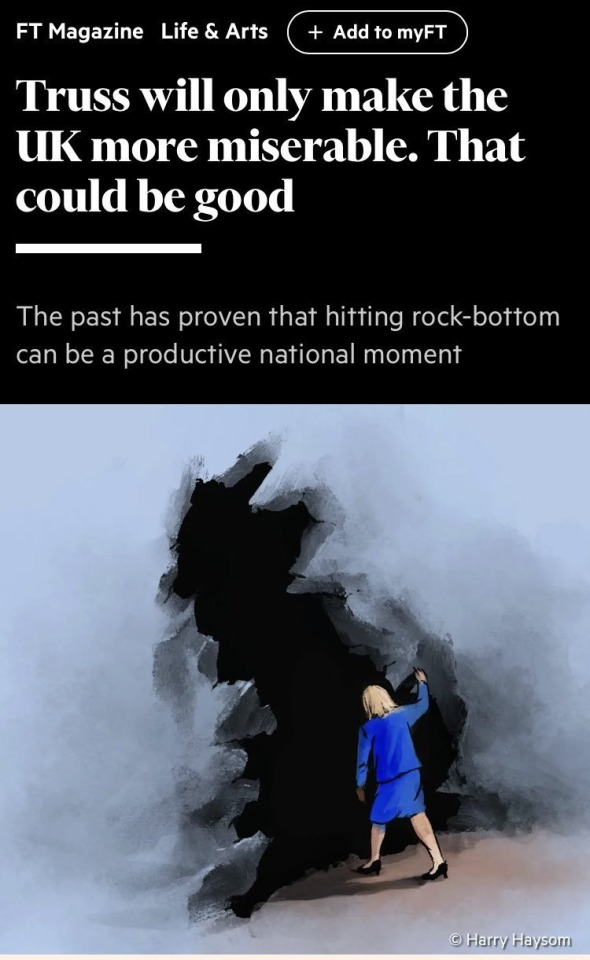
So the results ARE IN! She will definitely fuck us up! But that's a good thing for vague reasons! Blitz spirit everyone. Tally ho, pip pip, shoot a servant and have sex with a wall, hey what. Good old Blighty.
(That's my best impression of Tories I'm good at their accents I hope you like it)
Truss does an interview with Laura Kuenssberg, and fellow guest and comedian Joe Lycett wildly and effusively applauds her every word. Even Liz realises no one would sincerely applaud her. Bafflingly, the entire right wing press and every member of the Tory party freak out about this, because they don't understand the function of a satirist and don't know how to defend against it. It is extremely funny. Joe Lycett announces he's a right-wing comedian now, and begins a new extended career bit effusively and sarcastically praising right wing politicians. They all cry extensively and call him mean.
SO, it's been a long hard leadership campaign! But she made it. For years, Tories have been blighted by the curse of the PM/Chancellor relationship, backstabbing and cheating and lying about each other to try and get power. But not our Liz, oh no; her Chancellor is Maths Mate and BFF Kwasi Kwarteng, an insipid and poisonous gnome known for three (3) things:
He once wrote a stupid book with Liz Truss about his stupid opinions on how he thinks economics work and everyone laughed at him and stuffed him in a locker
On the night of the Brexit vote he was overheard by a journalist gleefully saying “Who cares if sterling crashes? It will come back up again“ which are of course the words of a man who knows all about economics and how they work
This fucking bullshit back in July:
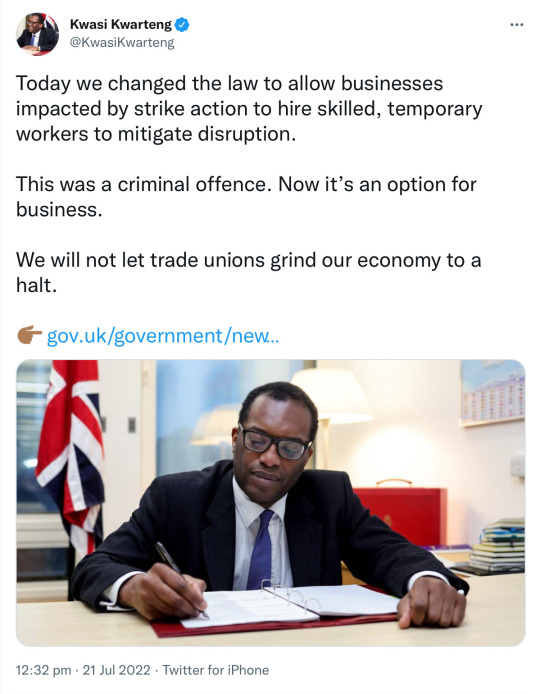
But hey IT'S OKAY! Everything is fine! Because Liz and Kwasi are BFFs who certainly never had an affair and are marching in lockstep and have each other's backs and both love maths more than their own children if they had any! Maths Friends!
Multiple resignations immediately follow.
Among them is Ben Elliot, the Tory Party chair, which is a pretty big deal from a man who just lived through the Johnson years; also, shockingly, Priti Patel, the deportation-happy Home Secretary, decides that even as an animatronic goblin she cannot support this nonsense.
It's not a resignation per se, but at ten to seven in the evening it's announced that Andrew Bridgen, the Troy MP for Leicestershire North West, has been evicted from his home and ordered to pay £800,000 in legal costs, and a possible £244,000 in rent arrears. Also described as "dishonest" by a judge.
This is not directly relevant to Liz Truss but look, it was a staggeringly weird day and this was basically the topper.
Anyway.
Liz goes to the Palace and is duly sworn in by the Queen, who promptly keels over and dies the very next day. Parliament is instantly shut down for mandatory mourning. As omens go, this one was not subtle.
This triggers the circulation of some very awkward footage of Young Truss talking about how she thinks the Monarchy should be abolished for being a gross relic of horrifying social stratification. However you must understand that it's not awkward because anyone thinks she murdered the Queen. It's because Liz Truss's attempts at public speaking are like sitting through a children's Christmas play when you're the only person in the audience and they can all see your face so you have to look encouraging for four hours when inside you are shrivelling into something approximating an apricot pit travelling to the core of Jupiter.
Take a look at her acceptance speech and wither.
Anyway we're now several MPs and a queen down so she's got to get on replacing those so she can focus on her real love: the much-anticipated mini-budget that she is preparing with Kwasi to save the UK from the harrowing quagmire of crippling poverty that Big Dog managed to drive us into (all while pretending it wasn't Big Dog who did it.)
Fortunately, she does not need to replace the queen! Monarchies take care of themselves, which many people would argue is very much the problem, of course. They had a proper reunion with Meghan From Suits and Meghan From Suits' husband, both of whom were banned from visiting Balmoral, and also the Nonce flew in, who was allowed to visit Balmoral. Such heartwarming scenes.
But the Cabinet, that's another matter. That's something Liz DOES have to do, and it's important she gets it right, Tumblrs, because you see, every time a Cabinet minister is replaced it's expensive and a hassle and it weakens a government by making them look all crumbly, like a packet of biscuits that's been rammed against a wall and now someone is opening it and everyone is bracing for Crumbs.
So, step forward to the Cabinet soulless ghoul Suella Braverman, the new Home Secretary. She immediately distinguishes herself by trying to legalise torture.
And then, naturally,
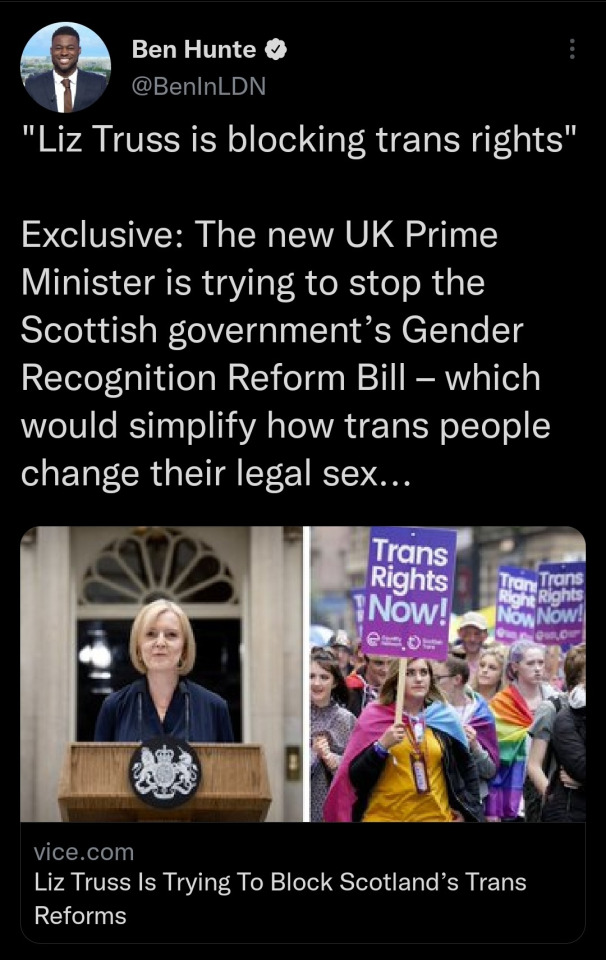

YEAH THAT'S RIGHT IT'S TICK TOCK TERF O'CLOCK also FUCK the sovereignty of the Scottish Parliament amirite ladies lol Girl Power uwu
Not that she can actually do anything at this point, of course. As I say: Enforced Mourning is in process, which means Parliament is shut down for ten days. No work, no speeches, no appearances, no announcements, just taxpayer's money going on legal fees to see if she can interfere with another nation's elected government in order to strip away the human rights of queer people.
However, while we all weep over the corpse of Queen Lizzie Two and beat our breasts in grief, the already-beleaguered pound is slowly bleeding out through this inaction. And this, to the Maths Mates, is unacceptable.
Two things get quietly slid into the news cycle.
Thing the First:

BIG YIKES LADS
Thing the Second:
Fracking ban in England lifted in bid to boost UK gas supply - BBC News
For those who don't know, fracking is an energy extraction process. Water, gas and dust are pumped at high pressure into shale bedrock to crack it open, releasing pockets of natural gas that can then be harvested for fuel. It's environmentally disastrous for multiple reasons, both direct (earthquakes, groundwater pollution, social impacts) and indirect (IT'S STILL A FOSSIL FUEL YOU STUPID CUNTS ARE YOUR SKULLS FUCKING EMPTY). The Welsh and Scottish governments have both banned it outright, a straight-up "Foot down no, petal". England, though, is the Tory paradise, so the ban was less complete.
However, this is still a Huge Deal - the 2019 Tory manifesto was very clear that fracking would only be unbanned IF "the science shows categorically that it can be done safely". In fact, most Tories don't like it either. Their constituents REALLY don't. Also in March Kwasi Kwarteng literally went on record and said it wouldn't lower European gas prices anyway; but not anymore! Now he thinks it's a zippy idea. Just spiffing. Top hole, pip pip (I'm so good at their accents :))
Scientists who have been studying the environmental impacts of fracking produce their report -
And it is quietly buried, so as not to offend the corpse of Lizzie Two.
Here ends the first four days of the Reign of Liz Truss.
Second Week
Anyway, royalists have gone insane and started a REALLY BIG queue to see a box that supposedly contains the rotting cadaver of the old queen. Multiple people have to be hospitalised because they join the Queue and don't take food, water, warm clothes, or essential daily medications with them, even though the Queue is literally days long. Some die. Many take the ashes of their own loved ones so they can wave them at the box for the thirty seconds they get to be in front of it, like a sort of play date for ashes.
Prince Charles, now King Prince Charles, starts swanning about as King, demanding everyone be sad for him and clap him to cheer him up. Someone holds up a sign saying 'Not my King' and gets arrested. This triggers a whole wave of protests and arrests as free speech slides out the window, until the Met Police chief has to step in and explain to the police like they're five-year-olds that they can't do that, actually, and need to cut that shit out.
But we can't wholly blame the police, because the main pressure to clamp down on protestors actually came from...
The government.
Meanwhile the country goes bat shit fucking insane. In order not to offend the fragile sensibilities of royalists, now so brittle they need to be treated with the same delicate touch normally reserved for unstable nitroglycerin, the UK sees supermarkets lowering the volume of self-serve checkout desks, people's funerals cancelled, vital operations and other medical interventions postponed, Centre Parcs cancelling holidays, FOOD BANKS CLOSING, Nintendo Direct cancelling its live stream in Britain (but not cancelling the release of the recording onto You Tube an hour later because as we all know Queen Elizabeth II was a MASSIVE livestream fan and would have been DEVASTATED to miss it but she was very 'meh' about YouTube), cycle racks being closed, and this unhinged shrieking harridan:
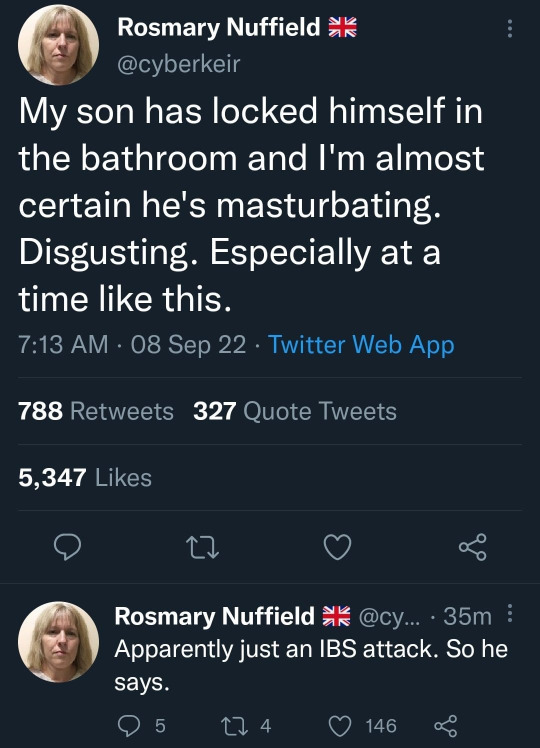
Very normal, lads. Very normal.
Oh and also they cancelled Owain Glyndwr Day so as a Welsh person I am now legally allowed to forcibly ram a daffodil into the urethras of the landed English gentry.
However, the protests grow as the suppression wanes. By the time King Prince Charles comes to Wales, he is met with silent protests, this guy who learned a sentence in Welsh specially for the occasion, and a petition to abolish the Prince of Wales title.
Except government is still shut down, so the petitions are all suspended.
But not to worry! That gives the Maths Mates more time to work on their special mini-budget.
Week Three
More of the same at first, really, but she finally addresses the nation to announce that the Queen was the "rock" on which "modern Britain was built".
Also someone finally spots that the necklace she always wears is a day collar, so that was fun.
BUT THEN
The moment we have all been waiting for, with baited breath.
On the 23rd September, 2022, the mini-budget finally arrives. The golden egg of Kwasi and Liz, their beloved, beautiful child, the crowning glory, the culmination of their economic beliefs and values. They are so proud of it, so sure of it, that they do not even submit it for the approval of the Office for Budget Responsibility. Why should they? This is the moment Kwarteng can finally show the world that he was right; that this is the way to do economics after all; that he alone in his brilliance and genius has reinvented the field and will lead the country to a new era of riches and prosperity.
And the pound does this:

Yikes.
Truss goes into hiding for a day and a half, during which time her aids claim all her relatives have died so she won't have to speak to the press, which is obviously a simply fantastic quality in a Prime Minister. Finally, she resurfaces by doing a series of radio interviews for regional stations around the UK, hoping they'll be easier on her, starting with Radio Leeds. The good journalists of Yorkshire eviscerate her and strew her corpse through Adel Woods. It's downhill from there.
Week Four
One poll puts Labour 33 points ahead of the Tories.
It can be a little difficult to translate polls, because the electoral system is complex, so I asked my journalist friends. They cheerfully informed me that, if translated into a General Election, the Tories would have just 3 seats left.
Except! Of course, naturally, that is me reporting naught but the most extreme result, Tumblrs, dancing upon the bones of my enemies as I chant the rites to make the Tory party die faster. If I were to be fair about this - and I am, of course, a journalist of Integrity and Morals - I would actually give the average poll result. And I am wise and fair to all, ancient rites aside, so I shall.
The average poll result is still 19 points ahead.
Tony Blair's landslide Labour victory in 1999 was 12 points.
Rounding off the day, Labour declare that they are backing a change to a proportional representation voting system in place of the UK’s archaic first past the post system. Funny that.
Anyway, that mini-budget is going poorly. Realising unlimited borrowing rather than tax cuts for the rich is maybe Bad Actually, the Maths Mates decide to get the money for their bail-outs some other way. Can you guess, Tumblrs? Can you guess where they decide to get the money from?

Naturally.
Week Five
In a fascinating little twist, the papers claim Liz banned King Prince Charles from going to the Climate Summit in Egypt. This is interesting for about a billion reasons, not least of which is that the papers seem very angry about this and yet also that it's an unsubstantiated rumour - the phrase "it's understood that _" gets a hell of a workout.
She then does not go herself. Makes sense. They'll probably be mean to her about the fracking.
She then loses the support of the Daily Mail, a paper that five weeks before were ecstatic about her rise to power :( so sad. But why? What made them change their minds?
Well. What else from Truss, but a massive and catastrophic u-turn on the economy?
And she does! The absolute nutter!
Plans to cut the 45p tax rate for those earning upwards of £150,000 were abandoned, as were:
abolishing the planned rise in corporation tax
cutting the basic rate of income tax
the two-year energy bill support plan
scrapping the planned dividend tax hike
VAT-free shopping for international tourists
freezing alcohol duty
easing of IR25 rules for the self-employed
ALL GONE! All gone. The mini-budget is not working so lol jk we'll think of something else, that's how government works, right? The pound promptly implodes further. Of all people, Nadine Dorries is the one to criticise
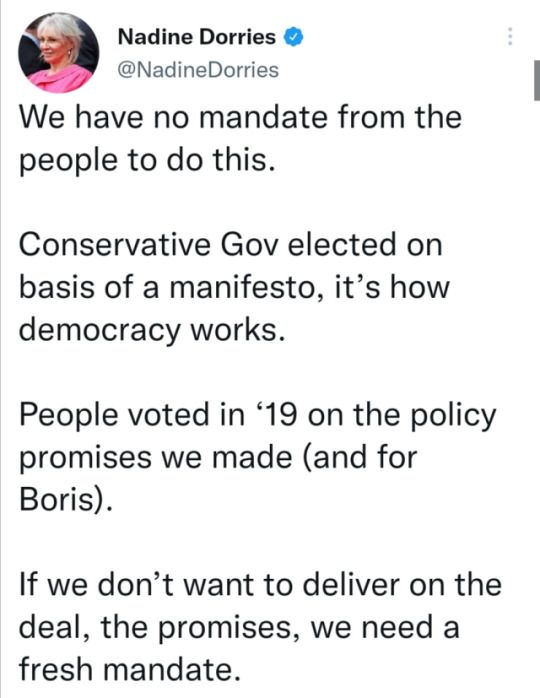
WE ARE IN A TOPSY TURVEY UPSIDE DOWN WORLD
The Daily Mail still finds a way to say it's all Michael Gove's fault, though.
Anyway, the 5th October dawns bright and beautiful and YouGov polls rural voters:
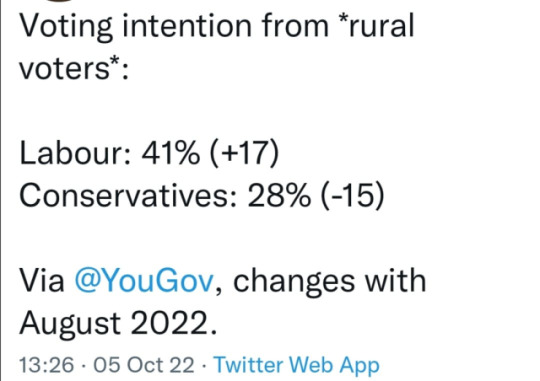
THIS IS HUUUUUUUUUGE, because farmers just will not fucking stop voting Tory, AND YET. Wowsers. Not just popularity. Voting intention. She might as well have personally infected every farm in the South Downs with foot and mouth disease.
Truss realises her popularity is plummeting and she needs a new audience. She tries to appear down with the kids and declares that she's the only PM to have gone to a comprehensive school.
This is not true. Gordon Brown and Theresa May both did. However, it's certainly true that all three of them became PM by ousting a sitting PM, so there's that I guess.
Week Six
At this point I can start putting in PRECISE DATEs just call ME Robert Peston.
13th October
News reporters start speculating that she'll be done by the end of the month as the first rumoured letter of no confidence reaches us. People realise that her competition for shortest serving PM was a guy who died in office of TB at about the four month mark RIP king sorry about your lungs.
(A reminder - normally, if MPs want to oust a party leader, they must send in 54 letters of no confidence. This makes the 1922 Committee - a bunch of back benchers who preside over this shit - hold a vote of no confidence. A leader who loses gives way - this is very rare. A leader who wins is then immune to another such vote for 12 months, but they almost always crumble within a month or two anyway - this is much more common.)
This is extremely funny, because a newly-elected leader of the party has a 12 month immunity to votes of no confidence, same as people who've won such a vote. Likes charge reblogs cast apparently. MPs are getting desperate.
Pressure mounts. Chancellor Kwasi Kwarteng announces that he is "Not going anywhere."
14th October
Chancellor Kwasi Kwarteng is sacked and blamed for the entire economic mess.
Incredibly, Liz does this without first planning a replacement, so it's several hours before Jeremy Cunt suddenly reappears like the spectre at the fucking feast.
Meanwhile here's Ed Milliband on Twitter

Seven and a half years he waited to retweet that. Seven and a half long years, look, to have the last laugh.
In the end, he still went too soon.
15th October
Deputy PM and also Health Minister Therese Coffey (side note - have they always doubled up in roles like that? Or are there just not enough of them anymore?) announces that she loves antibiotic resistance and dead kids and also breaking laws:

16th October
The Sunday Times calls for Extremely Corrupt Former Grand Vizier Rishi Sunak to take over, and then a General Election so that Labour can take the reins.
The SUNDAY TIMES
Calling for LABOUR
The Sunday Mail tries to stir up support for Ben Wallace taking over, because no one has heard of Ben Wallace so he needs the boost, but then accidentally publish their front page with a different man

In another YouGov poll for the Times, not a single political group, age group, area of the country, gender, or other demographic said that Liz Truss was the right choice for PM
This is the new predicted election graph:

Yikes
17th October
The projected election results are a Labour victory so complete the opposition would be the SNP. Legend suggests Nicola Sturgeon's cackle on finding out was so powerful she accidentally resurrected a witchfinder.
18th October
Meanwhile in the Senedd, Welsh Tory leader Andrew RT Davies, a sort of humanoid boil dressed in ham, tries to accuse placid and gentle First Minister for Wales Mark Drakeford's Labour of being responsible for long ambulance waiting times.
T'was a mistake.
youtube
19th October
Oh boy.
Well, first of all, Suella Braverman sends an official email from her private email address, and then promptly leaves the Cabinet at cannonball speeds as though she's seen a brown child about to be given citizenship. Was she quietly fired by Jeremy Cunt? Did she do it deliberately to resign? On her way out, she blames the true source of our problems - the Guardian-reading, tofu-eating Wokerati.
Nigella Lawson spends the day tweeting tofu recipes.
Meanwhile, Graham Brady, the Chair of the 1922 Committee, comes to Liz Truss to inform her that he has in fact now received 54 letters of no confidence. Normally, of course, that would be considered enough to trigger a vote in her leadership; but not now.
However, these are unprecedented times. So he changes the threshold - if half of the Tories send him letters, her immunity will be revoked.
But the thing is, Tumblrs, the thing is...
It is all about to kick off in the most spectacular and catastrophic fireworks since Guy Fawkes had a dream.
Because Ed Milliband, once accused of leading the country to chaos and now riding high on the joy of his well-timed Twitter jab of Some Days Ago, wakes this morning and chooses violence.
He has spotted, of course, that no one likes fracking; even the Tories are against it.
He has also spotted that Liz Truss is very stupid.
So he goes into the House of Commons, and he digs a big pit and covers it over with twigs and leaves so it can't be seen, and he bakes a big cake and he places it in the middle of the twigs, and he sets up a net to fall as well and a big stick of ACME dynamite, and he hammers in little signs everywhere saying CAUTION - TRAP, by which I am of course being metaphorical because what he actually does is table a motion to extend the moratorium on fracking. The signs aren't necessary, really. This trap is easy to avoid.
All Liz Truss has to do, you see, is not use a three-line whip on this vote.
The three-line whip, as you'll all recall, is the highest level of coercion. MPs cannot defy a three-line whip. MPs cannot even abstain on a three-line whip. MPs have two choices on a three-line whip: to vote as they're told, or to be removed from the party. You obey or resign. That's all.
For this reason, it's sometimes called a 'confidence vote', as it is effectively a stand-in for one. The vote is not about the issue at hand - this is now a vote of confidence in your leader.
(He's also laid lesser traps. Years back when fracking was first being heavily discussed, Ed was Labour leader and one of the main figures in those discussions. During today, before it all Kicks The Fuck Off, a Tory stands and challenges him on previous statements about fracking, trying to accuse him of hypocrisy.
He was fucking ready for it.)
Graham Brady pops his head back around the door. He's changed his mind - a third of the party is all that's needed now to trigger a vote of no confidence in Liz Truss. And legend says he's only 17 off.
This is presumably the reason for what comes next.
Liz panics. Liz sees she's desperately unpopular. Liz sees that she has to do something to shore up support; and she sees that her important fracking rule, which her party hates her for, is now being challenged by a former Labour leader, and if he wins (which he will) she'll lose all credibility and maybe they'll take her nice office away and tell her she was a Bad Girl.
And so, with the inevitability of gravity on the now-leaden pound sterling, she makes it a three-line whip, and a confidence vote in her government.
INSTANT CHAOS.
There is uproar! There is rage! There is blinding fury! Tory MPs are standing up in the Commons and snarling and pissing and moaning! No one likes fracking except Jacob Rees Mogg! For TWO HOURS they shriek and scream and gnash their teeth, yelling at Liz Truss, demanding to know why this is happening.
(Legend has it chaos-deity Ed Milliband simply leaned back, put his feet up on the chair in front, and made Christian Wakeford hand-feed him grapes and fan him with a palm leaf, but this is unsubstantiated.)
And then, at 6.55, FIVE MINUTES before voting is ready to begin, the Tory Minister for Climate Graham Stewart stands up and declares that everyone should vote how they want because it's not a confidence vote.
Did I say there was chaos before?
Lol. Lmao, even. Rofl, in fact.
Now Tories leap to their feet and basically all scream one long, unending breath of WHAT-DO-YOU-MEAN-IT'S-NOT-A-CONFIDENCE-VOTE-WHAT-THE-FUCK-IS-HAPPENING-IS-IT-OR-IS-IT-NOT-A-CONFIDENCE-VOTE and so Stewart gets up again and says, right to everyone's faces, "It's not for me to say whether it's a confidence vote or not," which is an even faster and more spectacular u-turn than Truss herself could pull off given that he literally just said it wasn't and did so while being a minister.
And then the voting starts. MPs are now milling about like chickens who've sighted the hawk, clamouring to know if they're going to lose their jobs unless they vote for Satan. The Whips - specifically Chief Whip Wendy Morton and Deputy Chief Whip Craig Whittaker - descend upon them like fucking wargs on the hunt. They don't just spit vitriol and blackmail into MPs ears. They fucking bodily drag people into the right voting lobby. MPs are legitimately screaming. Grown men are crying literal tears. Labour's Chris Bryant reports holding multiple Tory MPs as they sob into his shoulder. Multiple MPs report similar scenes.
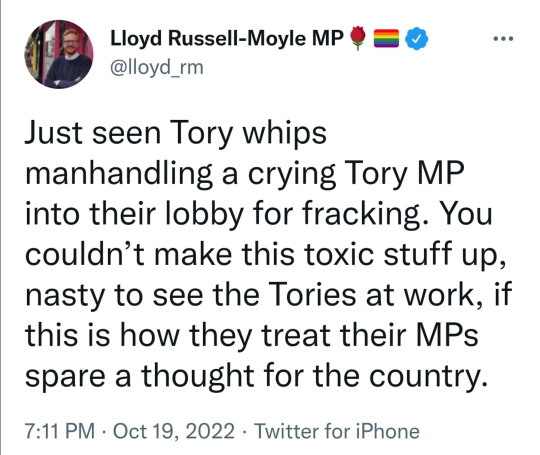
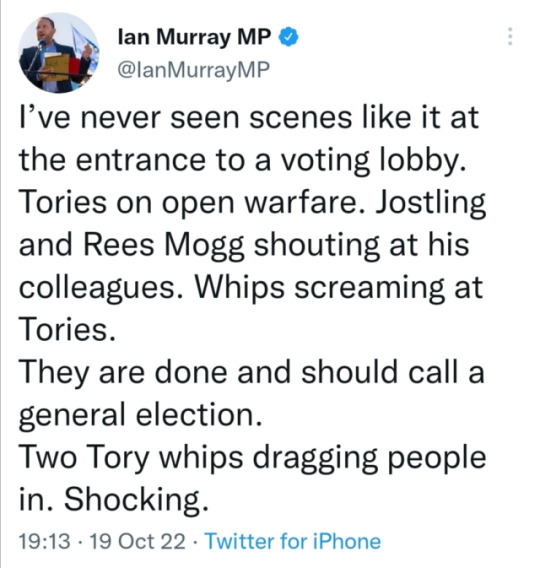
And Tories still don't know if this is even a damn confidence vote, or if they should just knock the Chief Whip's teeth out.
And then the Whips, filled with bloodlust and frenzy, suddenly realise that NO ONE IS LISTENING TO US, YOU'RE ALL SUPPOSED TO LISTEN TO US SO WE FEEL POWERFUL -
Cue sudden meeting in a locked room with Liz Truss. For over HALF AN HOUR.
So is it a confidence vote? No one is sure. Deputy PM Therese Coffey thinks so, so in the absence of the Whips she decides physical assault is her job now and is seen by David Linden MP (SNP) physically carrying someone into the voting lobby. Jacob Rees Mogg thinks not and starts yelling "It's not a confidence vote!", to which his colleagues reply, "Fuck off." Meanwhile the Whips have possibly resigned, no one is sure. It is still uncertain if this was a confidence vote.
And Ed Milliband basks in the chaos, playing the fiddle while it all burns around him.
Finally, voting concludes. The Whips reappear to lurk.


The votes are in - the government wins, and fracking will go ahead. But.
32 MPs abstained.
And one of those is Liz Truss.
Which is WILD??!? What possible benefit could she get from that??? No one knows. Everything is uproar again. Guess who else abstained? Well, riveted reader, here's a list with important names highlighted:
Nigel Adams, Gareth Bacon, Siobhan Baillie, Greg Clark, Sir Geoffrey Cox, Tracey Crouch, David Davis, Dame Caroline Dinenage, Nadine Dorries, Philip Dunne, Mark Fletcher, Vicky Ford, Paul Holmes, Alister Jack, Boris Johnson, Gillian Keegan, Kwasi Kwarteng, Robert Largan, Pauline Latham, Mark Logan, Theresa May, Priti Patel, Mark Pawsey, Angela Richardson, Andrew Rosindell, Bob Seely, Alok Sharma, Chris Skidmore, Henry Smith, Ben Wallace, Sir John Whittingdale, and William Wragg.
Kwasi still smarting about that p45, I see.
In any case it then turns out that Liz DID vote, but incompetently, because her voting card didn't read properly, which is actually fair given that she was being screamed at by angry Whips waving Graham Stewart's severed dick and balls around while they demanded power and authority. While she's clearing that up, the press are understandably waiting open-mouthed for comment, but don't worry Liz! Your old pal Jacob Rees Mogg is here to fill in for you!
And thus it is that JRM willingly chooses to go on the live news and calmly confirm to the nation that no one knows if it was a confidence vote or not.
Chaos. Chaos again. Unbridled chaos. The Whips are furious. Everyone is furious. The rebels are now in limbo, unsure if they're now out of a job. Tories are weeping, trying to work out if Rees Mogg WANTS to sink the party. Back bencher Charles Walker MP delivers a frank interview to the press absolutely SHIVERING with rage, like the drummer in a Fleetwood Mac concert. Ex-Lib Dem leader Tim Farron, a bland man known only for the time he himself willingly chose to go on the news and calmly explain that he's a homophobe without provocation, tweets that Liz Truss is a Lib Dem sleeper agent they sent in to destroy the Tories, sparking what is likely to be a whole slew of conspiracy theories by next week. No one knows what is going on. They all decide to sleep on it.
The good folks at Wikipedia ultimately decide to make three separate pages for the UK 2022 government crisis, and to label them with the month "to leave room for another by the end of the year."
Ed Milliband skips all the way home, and treats himself to a bacon sandwich.
20th October
Okay, Liz thinks, the morning after. Okay. Last night was bad. But today will be better.
So first... the vote.
Because there's bad news for Tories who like money and good news for people who like liveable planets - there are problems with the vote. For one, the vote counts are being called into question. Are the results reliable?
For another, the Speaker of the House of Commons calls for an investigation into the reports of, um, assault. So will the result stand?
It's so unclear! And so is that ongoing issue of whether or not the damn thing was a confidence vote. Angry whips say YES, JRM says NO, Downing Street refuses to pick up the phone to the BBC, but does send ITV's Robert Peston a text at 1am to say it was definitely a confidence vote and, unrelatedly, the Whips aren't resigning :)
I think we have found the price paid to keep the Whips.
Meanwhile. Let's see what this has done for Liz's leadership stability!
13 letters of no confidence are confirmed submitted by Sky, 5 of which came in overnight. The 1922 Committee reconvenes the coven to discuss matters. Simultaneously, the One Nation Conservatives reconvene their coven to discuss the same. Presumably there is much "Girl what are YOU doing at the Devil's Sacrament?"-ing and "Same cloak, how embarrassing"-ing. MPs are CLAMOURING for her head. It is VICIOUS. It's like cartoon piranhas in a supervillain's lair; which is highly appropriate, because that's exactly what Tory MPs are.
Graham Brady, head jester of the 1922 Committee, demands to see Liz Truss.
He walks into a room with her, and the doors are closed. Half an hour later, he walks back out of the room.
Ten minutes later, she calls a press conference.
45 days after being appointed, Liz Truss breaks the record, and becomes the shortest-serving British Prime Minister.
2K notes
·
View notes
Text
How to design a tech regulation

TONIGHT (June 20) I'm live onstage in LOS ANGELES for a recording of the GO FACT YOURSELF podcast. TOMORROW (June 21) I'm doing an ONLINE READING for the LOCUS AWARDS at 16hPT. On SATURDAY (June 22) I'll be in OAKLAND, CA for a panel (13hPT) and a keynote (18hPT) at the LOCUS AWARDS.

It's not your imagination: tech really is underregulated. There are plenty of avoidable harms that tech visits upon the world, and while some of these harms are mere negligence, others are self-serving, creating shareholder value and widespread public destruction.
Making good tech policy is hard, but not because "tech moves too fast for regulation to keep up with," nor because "lawmakers are clueless about tech." There are plenty of fast-moving areas that lawmakers manage to stay abreast of (think of the rapid, global adoption of masking and social distancing rules in mid-2020). Likewise we generally manage to make good policy in areas that require highly specific technical knowledge (that's why it's noteworthy and awful when, say, people sicken from badly treated tapwater, even though water safety, toxicology and microbiology are highly technical areas outside the background of most elected officials).
That doesn't mean that technical rigor is irrelevant to making good policy. Well-run "expert agencies" include skilled practitioners on their payrolls – think here of large technical staff at the FTC, or the UK Competition and Markets Authority's best-in-the-world Digital Markets Unit:
https://pluralistic.net/2022/12/13/kitbashed/#app-store-tax
The job of government experts isn't just to research the correct answers. Even more important is experts' role in evaluating conflicting claims from interested parties. When administrative agencies make new rules, they have to collect public comments and counter-comments. The best agencies also hold hearings, and the very best go on "listening tours" where they invite the broad public to weigh in (the FTC has done an awful lot of these during Lina Khan's tenure, to its benefit, and it shows):
https://www.ftc.gov/news-events/events/2022/04/ftc-justice-department-listening-forum-firsthand-effects-mergers-acquisitions-health-care
But when an industry dwindles to a handful of companies, the resulting cartel finds it easy to converge on a single talking point and to maintain strict message discipline. This means that the evidentiary record is starved for disconfirming evidence that would give the agencies contrasting perspectives and context for making good policy.
Tech industry shills have a favorite tactic: whenever there's any proposal that would erode the industry's profits, self-serving experts shout that the rule is technically impossible and deride the proposer as "clueless."
This tactic works so well because the proposers sometimes are clueless. Take Europe's on-again/off-again "chat control" proposal to mandate spyware on every digital device that will screen everything you upload for child sex abuse material (CSAM, better known as "child pornography"). This proposal is profoundly dangerous, as it will weaken end-to-end encryption, the key to all secure and private digital communication:
https://www.theguardian.com/technology/article/2024/jun/18/encryption-is-deeply-threatening-to-power-meredith-whittaker-of-messaging-app-signal
It's also an impossible-to-administer mess that incorrectly assumes that killing working encryption in the two mobile app stores run by the mobile duopoly will actually prevent bad actors from accessing private tools:
https://memex.craphound.com/2018/09/04/oh-for-fucks-sake-not-this-fucking-bullshit-again-cryptography-edition/
When technologists correctly point out the lack of rigor and catastrophic spillover effects from this kind of crackpot proposal, lawmakers stick their fingers in their ears and shout "NERD HARDER!"
https://memex.craphound.com/2018/01/12/nerd-harder-fbi-director-reiterates-faith-based-belief-in-working-crypto-that-he-can-break/
But this is only half the story. The other half is what happens when tech industry shills want to kill good policy proposals, which is the exact same thing that advocates say about bad ones. When lawmakers demand that tech companies respect our privacy rights – for example, by splitting social media or search off from commercial surveillance, the same people shout that this, too, is technologically impossible.
That's a lie, though. Facebook started out as the anti-surveillance alternative to Myspace. We know it's possible to operate Facebook without surveillance, because Facebook used to operate without surveillance:
https://papers.ssrn.com/sol3/papers.cfm?abstract_id=3247362
Likewise, Brin and Page's original Pagerank paper, which described Google's architecture, insisted that search was incompatible with surveillance advertising, and Google established itself as a non-spying search tool:
http://infolab.stanford.edu/pub/papers/google.pdf
Even weirder is what happens when there's a proposal to limit a tech company's power to invoke the government's powers to shut down competitors. Take Ethan Zuckerman's lawsuit to strip Facebook of the legal power to sue people who automate their browsers to uncheck the millions of boxes that Facebook requires you to click by hand in order to unfollow everyone:
https://pluralistic.net/2024/05/02/kaiju-v-kaiju/#cda-230-c-2-b
Facebook's apologists have lost their minds over this, insisting that no one can possibly understand the potential harms of taking away Facebook's legal right to decide how your browser works. They take the position that only Facebook can understand when it's safe and proportional to use Facebook in ways the company didn't explicitly design for, and that they should be able to ask the government to fine or even imprison people who fail to defer to Facebook's decisions about how its users configure their computers.
This is an incredibly convenient position, since it arrogates to Facebook the right to order the rest of us to use our computers in the ways that are most beneficial to its shareholders. But Facebook's apologists insist that they are not motivated by parochial concerns over the value of their stock portfolios; rather, they have objective, technical concerns, that no one except them is qualified to understand or comment on.
There's a great name for this: "scalesplaining." As in "well, actually the platforms are doing an amazing job, but you can't possibly understand that because you don't work for them." It's weird enough when scalesplaining is used to condemn sensible regulation of the platforms; it's even weirder when it's weaponized to defend a system of regulatory protection for the platforms against would-be competitors.
Just as there are no atheists in foxholes, there are no libertarians in government-protected monopolies. Somehow, scalesplaining can be used to condemn governments as incapable of making any tech regulations and to insist that regulations that protect tech monopolies are just perfect and shouldn't ever be weakened. Truly, it's impossible to get someone to understand something when the value of their employee stock options depends on them not understanding it.
None of this is to say that every tech regulation is a good one. Governments often propose bad tech regulations (like chat control), or ones that are technologically impossible (like Article 17 of the EU's 2019 Digital Single Markets Directive, which requires tech companies to detect and block copyright infringements in their users' uploads).
But the fact that scalesplainers use the same argument to criticize both good and bad regulations makes the waters very muddy indeed. Policymakers are rightfully suspicious when they hear "that's not technically possible" because they hear that both for technically impossible proposals and for proposals that scalesplainers just don't like.
After decades of regulations aimed at making platforms behave better, we're finally moving into a new era, where we just make the platforms less important. That is, rather than simply ordering Facebook to block harassment and other bad conduct by its users, laws like the EU's Digital Markets Act will order Facebook and other VLOPs (Very Large Online Platforms, my favorite EU-ism ever) to operate gateways so that users can move to rival services and still communicate with the people who stay behind.
Think of this like number portability, but for digital platforms. Just as you can switch phone companies and keep your number and hear from all the people you spoke to on your old plan, the DMA will make it possible for you to change online services but still exchange messages and data with all the people you're already in touch with.
I love this idea, because it finally grapples with the question we should have been asking all along: why do people stay on platforms where they face harassment and bullying? The answer is simple: because the people – customers, family members, communities – we connect with on the platform are so important to us that we'll tolerate almost anything to avoid losing contact with them:
https://locusmag.com/2023/01/commentary-cory-doctorow-social-quitting/
Platforms deliberately rig the game so that we take each other hostage, locking each other into their badly moderated cesspits by using the love we have for one another as a weapon against us. Interoperability – making platforms connect to each other – shatters those locks and frees the hostages:
https://www.eff.org/deeplinks/2021/08/facebooks-secret-war-switching-costs
But there's another reason to love interoperability (making moderation less important) over rules that require platforms to stamp out bad behavior (making moderation better). Interop rules are much easier to administer than content moderation rules, and when it comes to regulation, administratability is everything.
The DMA isn't the EU's only new rule. They've also passed the Digital Services Act, which is a decidedly mixed bag. Among its provisions are a suite of rules requiring companies to monitor their users for harmful behavior and to intervene to block it. Whether or not you think platforms should do this, there's a much more important question: how can we enforce this rule?
Enforcing a rule requiring platforms to prevent harassment is very "fact intensive." First, we have to agree on a definition of "harassment." Then we have to figure out whether something one user did to another satisfies that definition. Finally, we have to determine whether the platform took reasonable steps to detect and prevent the harassment.
Each step of this is a huge lift, especially that last one, since to a first approximation, everyone who understands a given VLOP's server infrastructure is a partisan, scalesplaining engineer on the VLOP's payroll. By the time we find out whether the company broke the rule, years will have gone by, and millions more users will be in line to get justice for themselves.
So allowing users to leave is a much more practical step than making it so that they've got no reason to want to leave. Figuring out whether a platform will continue to forward your messages to and from the people you left there is a much simpler technical matter than agreeing on what harassment is, whether something is harassment by that definition, and whether the company was negligent in permitting harassment.
But as much as I like the DMA's interop rule, I think it is badly incomplete. Given that the tech industry is so concentrated, it's going to be very hard for us to define standard interop interfaces that don't end up advantaging the tech companies. Standards bodies are extremely easy for big industry players to capture:
https://pluralistic.net/2023/04/30/weak-institutions/
If tech giants refuse to offer access to their gateways to certain rivals because they seem "suspicious," it will be hard to tell whether the companies are just engaged in self-serving smears against a credible rival, or legitimately trying to protect their users from a predator trying to plug into their infrastructure. These fact-intensive questions are the enemy of speedy, responsive, effective policy administration.
But there's more than one way to attain interoperability. Interop doesn't have to come from mandates, interfaces designed and overseen by government agencies. There's a whole other form of interop that's far nimbler than mandates: adversarial interoperability:
https://www.eff.org/deeplinks/2019/10/adversarial-interoperability
"Adversarial interoperability" is a catch-all term for all the guerrilla warfare tactics deployed in service to unilaterally changing a technology: reverse engineering, bots, scraping and so on. These tactics have a long and honorable history, but they have been slowly choked out of existence with a thicket of IP rights, like the IP rights that allow Facebook to shut down browser automation tools, which Ethan Zuckerman is suing to nullify:
https://locusmag.com/2020/09/cory-doctorow-ip/
Adversarial interop is very flexible. No matter what technological moves a company makes to interfere with interop, there's always a countermove the guerrilla fighter can make – tweak the scraper, decompile the new binary, change the bot's behavior. That's why tech companies use IP rights and courts, not firewall rules, to block adversarial interoperators.
At the same time, adversarial interop is unreliable. The solution that works today can break tomorrow if the company changes its back-end, and it will stay broken until the adversarial interoperator can respond.
But when companies are faced with the prospect of extended asymmetrical war against adversarial interop in the technological trenches, they often surrender. If companies can't sue adversarial interoperators out of existence, they often sue for peace instead. That's because high-tech guerrilla warfare presents unquantifiable risks and resource demands, and, as the scalesplainers never tire of telling us, this can create real operational problems for tech giants.
In other words, if Facebook can't shut down Ethan Zuckerman's browser automation tool in the courts, and if they're sincerely worried that a browser automation tool will uncheck its user interface buttons so quickly that it crashes the server, all it has to do is offer an official "unsubscribe all" button and no one will use Zuckerman's browser automation tool.
We don't have to choose between adversarial interop and interop mandates. The two are better together than they are apart. If companies building and operating DMA-compliant, mandatory gateways know that a failure to make them useful to rivals seeking to help users escape their authority is getting mired in endless hand-to-hand combat with trench-fighting adversarial interoperators, they'll have good reason to cooperate.
And if lawmakers charged with administering the DMA notice that companies are engaging in adversarial interop rather than using the official, reliable gateway they're overseeing, that's a good indicator that the official gateways aren't suitable.
It would be very on-brand for the EU to create the DMA and tell tech companies how they must operate, and for the USA to simply withdraw the state's protection from the Big Tech companies and let smaller companies try their luck at hacking new features into the big companies' servers without the government getting involved.
Indeed, we're seeing some of that today. Oregon just passed the first ever Right to Repair law banning "parts pairing" – basically a way of using IP law to make it illegal to reverse-engineer a device so you can fix it.
https://www.opb.org/article/2024/03/28/oregon-governor-kotek-signs-strong-tech-right-to-repair-bill/
Taken together, the two approaches – mandates and reverse engineering – are stronger than either on their own. Mandates are sturdy and reliable, but slow-moving. Adversarial interop is flexible and nimble, but unreliable. Put 'em together and you get a two-part epoxy, strong and flexible.
Governments can regulate well, with well-funded expert agencies and smart, adminstratable remedies. It's for that reason that the administrative state is under such sustained attack from the GOP and right-wing Dems. The illegitimate Supreme Court is on the verge of gutting expert agencies' power:
https://www.hklaw.com/en/insights/publications/2024/05/us-supreme-court-may-soon-discard-or-modify-chevron-deference
It's never been more important to craft regulations that go beyond mere good intentions and take account of adminsitratability. The easier we can make our rules to enforce, the less our beleaguered agencies will need to do to protect us from corporate predators.

If you'd like an essay-formatted version of this post to read or share, here's a link to it on pluralistic.net, my surveillance-free, ad-free, tracker-free blog:
https://pluralistic.net/2024/06/20/scalesplaining/#administratability

Image:
Noah Wulf (modified)
https://commons.m.wikimedia.org/wiki/File:Thunderbirds_at_Attention_Next_to_Thunderbird_1_-_Aviation_Nation_2019.jpg
CC BY-SA 4.0
https://creativecommons.org/licenses/by-sa/4.0/deed.en
#pluralistic#cda#ethan zuckerman#platforms#platform decay#enshittification#eu#dma#right to repair#transatlantic#administrability#regulation#big tech#scalesplaining#equilibria#interoperability#adversarial interoperability#comcom
99 notes
·
View notes
Text
WaPo: How car bans and heat pump rules drive voters to the far right
Shannon Osaka at WaPo:
More than a decade ago, the Netherlands embarked on a straightforward plan to cut carbon emissions. Its legislature raised taxes on natural gas, using the money earned to help Dutch households install solar panels. By most measures, the program worked: By 2022, 20 percent of homes in the Netherlands had solar panels, up from about 2 percent in 2013. Natural gas prices, meanwhile, rose by almost 50 percent.
But something else happened, according to a new study. The Dutch families who were most vulnerable to the increase in gas prices — renters who paid their own utility bills — drifted to the right. Families facing increased home energy costs became 5 to 6 percent more likely to vote for one of the Netherlands’ far-right parties.
A similar backlash is happening all over Europe, as far-right parties position themselves in opposition to green policies. In Germany, a law that would have required homeowners to install heat pumps galvanized the far-right Alternative for Germany party, or AfD, giving it a boost. Farmers have rolled tractors into Paris to protest E.U. agricultural rules, and drivers in Italy and Britain have protested attempts to ban gas-guzzling cars from city centers.
That resurgence of the right could slow down the green transition in Europe, which has been less polarized on global warming, and serves as a warning to the United States, where policies around electric vehicles and gas stoves have already sparked a backlash. The shift also shows how, as climate policies increasingly touch citizens’ lives, even countries whose voters are staunchly supportive of clean energy may hit roadblocks.
“This has really expanded the coalition of the far right,” said Erik Voeten, a professor of geopolitics at Georgetown University and the author of the new study on the Netherlands.
Other studies have found similar results. In one study in Milan, researchers at Bocconi University studied the voting patterns of drivers whose cars were banned from the city center for being too polluting. These drivers, who on average lost the equivalent of $4,000 because of the ban, were significantly more likely to vote for the right-wing Lega party in subsequent elections. In Sweden, researchers found that low-income families facing high electricity prices were also more likely to turn toward the far right.
Far-right parties in Europe have started to position themselves against climate action, expanding their platforms from anti-immigration and anti-globalization. A decade ago, the Dutch right-wing Party for Freedom emphasized that it wasn’t against renewable energy — just increasing energy prices. But by 2021, the party’s manifesto had moved to more extreme language. “Energy is a basic need, but climate madness has turned it into a very expensive luxury item,” the manifesto said.
“The far right has increasingly started to campaign on opposition to environmental policies and climate change,” Voeten said.
The pushback also reflects, in part, how much Europe has decarbonized. More than 60 percent of the continent’s electricity already comes from renewable sources or nuclear power; so meeting the European Union’s climate goals means tacklingother sectors — transportation, buildings, agriculture.
[...]
Some of these voting patterns have also played out in the United States. According to a study by the Princeton political scientist Alexander Gazmararian, historically-Democratic coal communities that lost jobs in the shift to natural gas increased their support for Republican candidates by 5 percent. The shift was larger in areas located farther from new gas power plants — that is, areas where voters couldn’t see that it was natural gas, not environmental regulations, that undercut coal.
Gazmararian says that while climate denial and fossil fuel misinformation have definitely played a role, many voters are motivated simply by their own financial pressures. “They’re in an economic circumstance where they don’t have many options,” he said.
The solution, experts say, is todesign policies that avoid putting too much financial burden on individual consumers. In Germany, where the law to install heat pumps would have cost homeowners $7,500 to $8,500 more than installing gas boilers, policymakers quickly retreated. But by that point, far-right party membership had already surged.
The Washington Post explains what may be at least partially causing the rise of far-right extremist parties in Europe, Conservatives in Canada, and the Republicans in some parts of the US: rising energy costs that low-income people are bearing the brunt of.
In the US, right-wing hysteria about gas stove bans and electric vehicles are also playing a role.
101 notes
·
View notes
Text
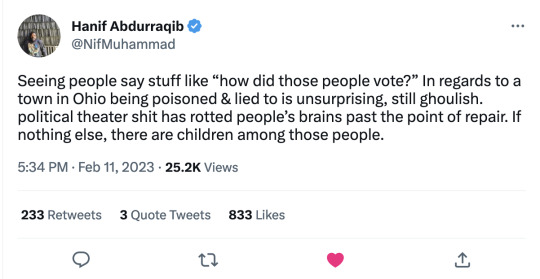
i wanted to piggyback off this very good tweet and remind everyone that-
Ohio's current voting maps are fucked!
The maps that were used in Ohio's 2022 election were ruled unconstitutional by the Ohio Supreme Court. And were found to be gerrymandered in favor of the Republican party (surprise surprise).
So the government currently in charge of handling the East Palestine disaster was elected unconstitutionally! :)
You can read up about that here! [1] [2] [3] [4]
Additional fun facts about Ohio's government!
- A former members of said government's political party is currently on trail for corruption!
- They slipped in a bill banning trans women from competing in school sports at 11:56 PM, putting it into an unrelated bill, so it couldn't be reviewed! (it was later shot down but they still used a shitty tactic to try and get it passed)
So yeah! Fuck the "Elect shitty people, live with the shitty results" attitude that's use to downplay and victim blame people living in rural, blue collar, "republican" states.
#Ohio#East Palestine#politics#current events#sorry to be political on fandom blog#we've just been living in this constant hellstate#Ohio has been a fucking meme everywhere but no one is talking about our fucked political state.#i haven't seen much about the train situation on tumblr and i wish more people would talk about it
634 notes
·
View notes
Note
the state of israel MUST be dismantled for a free palestine. jews existed and lived in ME before the existence of Israel, and jews will continue to live in ME but Israel as a state has to go. israel didnt bring the jews to ME.
See... the whole "Jews will continue to live" thing is what I'm not so sure of.
I understand where people are coming from when they talk about how Israel as a nation-state must be dismantled. It was established by outside forces, maintained by those outside forces, and has in past decades engaged in some truly heinous behavior.
However, that behavior was enacted by the government, which is not all of Israel, nor even all of the Jews in Israel. That government's behavior also reflects on those people of Israel, and any revenge against the government--which is likely if dismantled--is likely to land on the shoulders of the people of Israel who may not have anything to do with it.
There are pacifists and children in Israel, just as there are in Palestine. There are people protesting the conflict in Tel Aviv and Jerusalem.
Over half of the Jews in Palestine are of a Mizrahi background, and either came to Israel from Arab countries that wanted them gone, or are the descendants of the people who did so. The establishment of Israel by the Sykes-Picot agreement resulted in many countries having a place to send their unwanted Jewish population to, and those countries now had the option of driving out, or at least 'encouraging,' those populations to leave. Operation Magic Carpet wasn't driven solely by the Imam of Yemen; Israel played its own role in it, as did the US and UK, but the result was a mass exodus of Jews. In 2022, there were a total of six Jews in Yemen. Now, there is only one.
Those Mizrahi Jews are also by and large not part of the Israeli government.
Many of the others in Israel are holocaust survivors, or the descendants of such.
It is not a stretch to say that Israel is, statistically, a country of refugees and their children.
Many of the powers most vocal about dismantling Israel are also the most vocally antisemitic. The most obvious example is the Yemeni Houthis, who have "death to all Jews" as a slogan. Hamas is aligned with them, and both are aligned with Iran, and Hezbollah. None of these specific groups want Jews in the ME, period. Some have made it very clear they don't want Jews to live at all, anywhere. It's not 'Jews who support the Israeli state' that they object to, it's Jewish people, period.
My hesitation about the argument to dismantle Israel is that I haven't seen anyone yet talk about how to go about doing it without a risk that there is another mass exodus or mass murder.
Un-fucking-fortunately, that possible result is also what Israel's government is using as their justification for war against their neighbors, and what it has been using for the better part of eighty years.
I am not defending Israel's actions. I do not condone what they are doing in Gaza. I do not condone what they are claiming about Gaza, and I have heard some truly horrifying propaganda that is getting fed to Zionists to keep the fervor up. I do not think that what they are doing in the Occupied West Bank is ethical. I do not think the Israeli government has a leg to stand on in terms of morality and ethics.
I also think that people who say "Israel should be dismantled" are looking at the past and turnabout as fair play without actually asking 'what will happen to the people who live there if a group like Hamas or the Houthi rebels or Hezbollah uses a weak transition period or sudden collapse as a chance to enact that revenge.
I don't know what the correct solution is. Rebuilding a government with both Israeli and Palestine officials in a joint system, unifying the two regions with the UN enforcing a fair and equal election and representation system? The two-nations solution that people have been talking about for ages, booting Israel from the Occupied West Bank and Gaza, and demanding they pay reparations to the people of Palestine? I don't think withdrawing all international interest and support to let them work it out among themselves is the right call. I don't think having Israel take over completely, or Palestine take over completely, is going to end well for whichever community ends up Not In Charge.
I don't know what can be done. I just know that the short, sweet, pithy 'dismantle Israel' and 'Zionism is bad' statements only sound good until you ask 'but where will the Jews, hated by most of the ME for what their government has been doing, and hated for millennia before that for existing, go?'
Which sucks, because Israel's government sure as hell didn't ask where the people of Palestine would go when they started pushing them out.
It's not fair! It's not fair to Palestine that this all is happening. It is not fair that the founded but unrealized risk to Israeli lives is being weighed against the fully realized and ongoing threat to theirs. It is not fair that thousands of children are dying of air strikes and hunger.
Palestine is undergoing a massacre at the hands of the Israeli government.
It is entirely possible that Israel will undergo that same massacre at the hands of Hamas and its allies if the 'dismantling' happens without safeguards.
Israel needs to stop. People are dying in the tens of thousands in Gaza because of their completely disproportionate response. A ceasefire is unquestionably needed and the ongoing refusal of the US government to help enforce one by pulling support from the IDF is a failure.
(No, not the Houthi strikes. That is a related, but distinct situation.)
But 'dismantle Israel' tends to come with few ideas on how to do so without risking the same situation as now, but in the other direction, and with the same or larger possibility of escalating into a wider regional conflict.
I don't know. I don't fucking know. But please understand that I am coming at this from a place of attempted compassion and concern. I am not trying to be dismissive of people's claims. I do not support Israel's actions. I don't even necessarily think Israel, as it is and as it was founded and as it acts, deserves to remain the power and government that it currently is. Restructuring, renaming, integrating, all these things are options, maybe even necessary ones.
I just don't think 'deserve' is the only consideration when the past seventy-odd years have been spent sowing the seeds of hate and revenge, and so many military groups in their area have expressed a desire to see all of them dead.
If you know of a 'dismantle Israel' plan by Palestinians, rather than some random Western Leftist, that includes plans on how to integrate the people that have in some cases been there for decades, and in some cases ended up there because they were driven or 'encouraged' out of neighboring Arab states...
Let me know.
But please recognize that I am trying my best to base my opinions on compassion and ethics and morality and awareness, not just parroting the news without thought, or my echo chamber, or whatever the first take to come to mind is. I am not trying to be malicious. I am not trying to be ignorant. I am not trying to 'stan America' or whatever people have been saying in my ask box.
They bombed me, too.
#Anonymous#I didn't start talking about the conflict in my own words until I felt I had a strong enough grasp on the facts and propaganda#to know what I was even saying.#phoenix answers asks#politics#current events#palestine#israel#gaza#death tw#antisemitism#islamophobia#death mention#genocide mention#ethnic cleansing
56 notes
·
View notes
Text
HOW MUCH THE NRA AND THE 'EVIL' GUN LOBBY SPENDS EACH YEAR.
The popular narrative from prohibitionists is that the lack of legislative support for various gun control schemes is due to aggressive lobbying. The story goes that “blood money” from the National Rifle Association and other gun lobby efforts along with the firearm industry has a stranglehold on elected officials who are just pining to do “the right thing” but are being drowned out by all the cash.
How much money is actually spent by the NRA on lobbying? How does this compare to lobbying efforts from elsewhere?
Statista is a German online platform specializing in data gathering and visualization in German, English, Spanish, and French. The company provides statistics and survey results presented in charts and tables. Its main target groups are business customers, lecturers, and researchers, offering subscriptions to a database of companies in the same manner as Bloomberg L.P.
Statista’s data partners include the Federal Statistical Office, the Allensbach Institute for Public Opinion Research, the OECD, and the German Institute for Economic Research. Other partners include the Financial Times and Fortune. Financial Times Germany named them among the winners of the start-up competition, Enable to Start.
Major U.S. Political Lobbying
The big three in major U.S. political lobbying are Pharmaceuticals/Health Products ($357 million per year), Electronics Manufacturing ($180 million per year), and Insurance ($153 million per year.)

Major annual lobbying expenditures in the United States
www.statista.com/statistics/257364/top-lobbying-industries-in-the-us
Critical note: Statista felt compelled to add the following footnote to this chart:
The NRA and lobbying: One of the most famous lobbying organizations in the United States is the National Rifle Association (NRA), which lobbies lawmakers in favor of gun rights. However, despite this, it only spent around 2.2 million U.S. dollars on lobbying expenditures in 2020.
Apparently, they received so many inquiries as to why the NRA wasn’t included in that chart above they included the answer right underneath: the NRA spends a marginal fraction on lobbying compared to the actual big spenders.

NRA (bottom) compared to the actual big lobby efforts.
Gun Lobby Money:
The NRA typically spends a few million dollars per year on lobbying. From 1998-2022, the most the NRA spent on lobbying in a single year was just over $5 million. Most years it’s between 1.5-2.5 million.

www.statista.com/statistics/249398/lobbying-expenditures-of-the-national-rifle-associaction-in-the-united-states/
The National Shooting Sports Foundation also lobbies. In 2023, according to federal records, the NSSF spent the most in lobbying in its 60-year history: $5.4 million on federal lobbying, slightly more than the NRA’s all-time annual record amount.
Anti-Gun Lobbying:
Firearm prohibitionists claim there is some large grassroots movement to push for legislative restrictions. It turns out that many anti-gun organizations are astroturfing fronts funded as tax deductions by a small group of very wealthy donors. These “organizations” provide no services with all funding received as contributions.
As an example, “March for Our Lives” bills itself as a grassroots movement of young people working to restrict gun ownership under the guise of safety. In reality, this is a front group funded by a few dozen donors. According to public tax documents for March for Our Lives, the group is funded almost entirely by large tax-deductible donations in excess of $100,000 with less than 1% of all donations from people donating less than $5,000. Nearly 100% of “March for Our Lives” income is Contributions serving as a tax deduction for donors and no Program Services are offered. Contrast this to the NRA’s public tax records where nearly half of the income is from Program Services and about a third is from Contributions.
Lobby Money Breakdown
Pharmaceutical companies spend the most on lobbying, much more than any other industry or sector. Pharmaceutical companies spend more on lobbying than second and third place (Electronics Manufacturing and Insurance) combined. Novo Nordisk, the maker of the obesity drug Ozempic, has spent $10 million per year just to lobby for that one drug with their primary effort pushing for the passage of the proposed Treat and Reduce Obesity Act which would emphasize regular prescription by doctors to patients for Ozempic. That doesn't count the $100 million Novo Nordisk has spent in advertising this drug to the general public.
Dr. Fatima Cody Stanford, appointed to the current Dietary Guidelines Advisory Committee, has declared that “obesity cannot be treated with exercise and good diet” and is pushing for more pharmaceutical interventions. This push is for drug interventions such as Ozempic. Prior to this appointment, Dr. Stanford had been a paid consultant for Novo Nordisk.
#the great awakening#government corruption#fjb#wef#bill gates#illegal immigration#joe biden#democrats#donald trump#world economic forum#nra#lobbyists should be banned#big pharma lobby#nra lobby
31 notes
·
View notes
Text
A recent study suggests that up to 2.7 million non-citizens could vote illegally in the 2024 election, raising alarms about the integrity of the democratic process. The report from Just Facts, a nonprofit research institute, estimates that between 10% to 27% of adult non-citizens in the U.S. are illegally registered to vote. With millions of potential illegal votes, critics fear the results of key elections may not reflect the true will of American citizens. The findings have ignited debate about election security, illegal immigration, and the challenges of ensuring only citizens vote in federal elections.
Key Facts:
– The Just Facts study estimates that between 10% to 27% of non-citizen adults are illegally registered to vote in the U.S.
– The U.S. Census counted over 19 million non-citizen adults in 2022, meaning between two and five million could be illegally registered voters.
– In 2008, a study showed that 81% of non-citizen votes went to Democrats.
– Former President Trump has promised to address illegal immigration and voter fraud by strengthening border security and deporting non-citizens.
– Critics, including think tanks like the Cato Institute, have questioned the accuracy of the study’s estimates.
The Rest of The Story:
The report by Just Facts has sparked significant concern about illegal voter registration ahead of the 2024 election. According to the study, anywhere from two to five million non-citizens are currently registered to vote, which could influence the outcomes of major races, including the presidency. These estimates are derived from U.S. Census data showing that 19 million non-citizen adults live in the country.
James Agresti, the author of the study, explained that non-citizens can easily register to vote because states don’t require proof of citizenship. “In no state in the nation are they required to provide proof of U.S. citizenship in order to register to vote,” Agresti noted, highlighting the loopholes in voter registration processes.
The report has drawn attention to how these illegal votes could skew results, as seen in past elections. In 2008, for example, 81% of non-citizens who voted reportedly favored Democratic candidates. Concerns about election integrity have grown since the 2020 election when a vast number of votes were cast by mail or early, which some critics believe made it harder to detect potential fraud.
While supporters of voter registration reforms are pushing for stronger verification processes, critics have downplayed the study’s findings. The Cato Institute, for instance, claims that the number of non-citizens voting could be closer to zero, casting doubt on the validity of the study’s estimates.
Commentary:
The prospect of non-citizens voting in federal elections should alarm every American who values democracy. If even a fraction of these estimated illegal votes come to fruition, it could shift the balance of power in major elections.
13 notes
·
View notes
Text
Silence, Siege and Persecution: Venezuela’s Media After the Elections
“Today I heard on the radio: ‘Our programming today will be 100% music, because music is a refuge, a safe place,’” economist Omar Zambrano tweeted a few days after the July 28th elections. In fact, for almost two weeks after the disputed results were announced by the National Electoral Council and spontaneous protests erupted throughout the country, most radio shows –including those with the largest audiences, such as journalists Shirley Varnagy’s and Román Lozinki’s– went off the air.
“These have been difficult weeks for all of us as citizens, including those of us who practice this profession”, Varnagy said in an Instagram post after two weeks of silence. “The circumstances force me to think very carefully about the words I say and write. I don’t live abroad, I’m inside.” Varnagy then announced she wouldn’t return to the radio until September 9th, more than a month after the presidential elections. Lozinski returned on August 26th. “I insist that these have not been easy days for those of us who make a living from the radio,” he said on an Instagram post announcing his return.
But the silence, the veiled messages, weren’t limited to Venezuela’s already highly-censored radio stations – of which more than 150 have been closed down by CONATEL, the government’s telecommunications agency, since 2022 according to the National Press Workers Union (SNTP).
As reports of detentions and passport annulments multiplied after the elections, the silence–usual in television, newspapers and most radio shows–suddenly swayed through social and online media too.
Journalists put their accounts private or altogether stopped tweeting, political podcasts halted and Venezuelan independent media started to publish articles without bylines (as we’ve been doing in Caracas Chronicles).
A week after July 28th, journalist Alonso Moleiro accurately described the ambiance: “The prevailing feeling is fear,” he wrote in the Spanish newspaper El País. “Politicians are hermetic. Interviews are canceled. People close to political leaders change their phone numbers. There is a huge hesitance in WhatsApp groups; Zoom conversations are rare. The police harass citizens looking for data on their mobile phones.”
The crackdown against the press ramped up before July 28th, when CONATEL ordered that public and private internet providers block a series of independent media, watchdogs and fact-checking websites. First, on early July, the government blocked anti-disinformation fact-checkers Es Paja, Cazadores de Fake News and Observatorio de Fake News alongside the media NGO Instituto Prensa y Sociedad de Venezuela (IPYS Venezuela) and VPN service Proton. Then, on July 22, the sites of watchdogs Medianálisis and VE Sin Filtro were blocked alongside independent media El Estímulo, Analítica and Runrunes.
During the same period, Nicolás Maduro repeatedly referred to foreign media agencies –including Reuters, AFP, AP, EFE and CNN– as “garbage” and “hitmen of untruthfulness.” His legislature speaker, Jorge Rodríguez, even engaged in an online brawl with APEX–the Foreign Press Association in Venezuela.
Then, the elections came. And detentions followed.
Since July 28th, 13 journalists and press workers have been detained in the country by state security forces, according to the SNTP (four have been freed, including one on parole). Three of them–including Ronald Carreño, a political prisoner with ties to opposition party Voluntad Popular who had been released last year as part of the US-Venezuela talks–were arrested for belonging to opposition parties. Other detained journalists including showbiz reporter Carmela Longo–who was released on parole afterwards, but charged with terrorism–, La Patilla journalist Ana Carolina Guaita in La Guaira, and photojournalist Deisy Peña in Los Teques, were taken for just doing their jobs.
“Our media outlet has a profile that is very different from the rest and we don’t do hard news,” says Irene (fake name), who works in a small Venezuelan digital outlet. “But in the end, as Carmela’s case shows, anyone can get in trouble for whatever reason now without you necessarily doing anything.” The pattern is changing. Before the elections, detentions were mostly focused on people helping the opposition campaign or participating in it. In fact, the three journalists detained before the elections–Gabriel González, Luis López and Carlos Julio Rojas–had ties to political parties or grassroots political movements. But, since July 28th, repression has drifted towards reporting-focused journalists.
The role of journalists in narrating the people’s rejection of the results announced by the CNE and the coverage on their veracity led to a “policy of silencing, of siege, of persecution” against the press, SNTP Secretary General Marco Ruiz says. Similarly, he says, there’s been a policy of silencing the coverage of protests and anti-government expressions.
And the July 28th elections have not only unleashed detentions. “We have recorded campaigns of hate and criminalization against journalists in different states like Aragua, Portuguesa, Carabobo, Zulia, Bolívar, Táchira,” Ruiz says, “Many of them are now in safekeeping. In other cases, we have had to use extraction procedures and they are outside the country because they were at risk of arrest.”
The situation has also changed the content and internal dynamics of Venezuelan outlets. “Everything we had planned to publish during the rest of the year is now paralyzed,” Irene says, “because now we are not publishing anything that doesn’t have to do with what’s happening, because we think there’s nothing more important.” Some of her colleagues, she says, have also stopped tweeting because of the emotional toll.
Similarly, outlets –including Caracas Chronicles– have faced difficulties to find sources willing to speak on the record or contribute with their analyses. “I can’t find voices willing to give a testimony on what’s happening in Venezuela, they are taking a lot of care”, says veteran Venezuelan journalist César Miguel Rondón, who hosts a radio program in Miami, “No one wants to end up disappeared, in a jail, because of some henchman’s whims… I think we had never seen a situation as ugly and dangerous as this one.”
In fact, many journalists have been affected by the massive annulment of passports that social activists, politicians and NGO members have also reported. “I know of correspondents who had their passports annulled,” says Nancy (fake name), who works as a stringer in Caracas for an international outlet and decided to leave the country after the elections. “I know of other journalists who also left the country under the radar, I know of photojournalists who have decided not to publish political pictures on their social media or asked for credit to be removed, I know of international media outlets who are now solely doing remote work to avoid the risk of going to their offices.”
This is why so many outlets are publishing articles without bylines and the alliance Venezuela Vota resorted to creating the AI avatars of Operación Retuit to broadcast news summary videos without risking their staff.
“We put safety of the team and staff as the top priority of the media outlet where I work and lead,” said Carlos (fake name), the director of a Caracas-based digital outlet. His site is not publishing bylines and has avoided sending journalists to cover protests “due to the risk of arbitrary detention.” The team is also using alternative messaging applications like Signal (blocked in Venezuela after the elections) and working remotely. Carlos says they have also designed a protocol to offer a safehouse to any journalist in his team who is threatened and even to be extracted from the country “in coordination with international networks of journalists specialized in this type of actions.”
For Nancy, journalists in national and regional outlets are at more risk but she doesn’t rule out the possibility of crackdowns on correspondants and stringers. “Now I have an enormous terror I had never felt,” she says, “especially because of how random the decisions seem and how unclear the rules of the game are. It’s basically a roulette and you never know when your turn will be.”
The State has also cracked down against social media and digital communications beyond the work of the press. Checkpoints where officers check people’s phone for pro-opposition content, usually leading to detentions or thousand-dollars extortions, have become common throughout Caracas and the rest of the country after July 28th. In fact, the government has called on Venezuelans to stop using Whatsapp and even blocked X–originally for ten days, but the deadline passed on and the network continues to be inaccessible in Venezuela without a VPN.
“The underlying problem is that WhatsApp is the platform that people used to efficiently disseminate information horizontally” and without censorship during the campaign and post-electoral protests, human rights activist Rafael Uzcátegui says. “Censorship in social media is not only to try to avoid people from expressing themselves, or being afraid to do so, but also to neutralize their autonomous capacity to establish links with others that bypass the state” and its media ecosystem.
In fact, the government has even threatened influencers who publicly supported María Corina Machado.
“You have to decide whether you want to continue your careers, first of all, with your families in Venezuela”, Maduro said, addressing celebrities–particularly Miami-based Youtube humorist Lele Pons–and social media stars that hosted lives and podcast episodes with Machado.
Maduro even accused Pons of conspiring to “impose” a government in Venezuela.
In fact, on July 31st during a press conference with international media, Maduro said “TikTok and Instagram are in the hands of imperialism” and “they are manipulating [people] to bring a civil war to Venezuela.” He then lambasted international agencies: “Do not insist on your agenda to bring war to Venezuela,” he said, “you, the international media, are responsible for the death and wars in Afghanistan, Iraq and Libya.”
A month after the elections, Maduro charged against the media again: this time, he accused local outlets TalCual, Efecto Cocuyo and El Pitazo of receiving USAID funds and of being part of the alleged conspiracy that the government blames for the recent nationwide power outage.
“This is an informal curfew against journalists, imposed de facto,” Ruiz says, “to dismantle the journalistic profession and the media in practically all the states of the country.”
“What I fear the most is the government’s level of evilness. I know they are capable of going against children and the elderly alike, and I will die if they touch my parents or my child,” says Nancy, who is unsure about returning to Venezuela, “this changed. And very quickly.”
16 notes
·
View notes
Text
To Understand Trump’s Staying Power With the White Working Class, Look at Michigan
Supporters remain loyal to former president’s policies, personality
Tuesday February 27, 2024 Wall Street Journal
By Jimmy VielkindFollow and Ariel Zambelich
DEARBORN, Mich.—At its peak, more than 100,000 people streamed in and out of the massive
Ford Motor factory here along the Rouge River. In addition to cars and trucks, the behemoth plant helped mint the American middle class.
The thousands of people who still work here and at other factories across Michigan and other Midwest states helped forge those states’ politics. These blue-collar voters were for many years reliable Democrats, but in 2016 a big group of them, mostly white, helped Donald Trump capture the presidency—including an unexpected win in Michigan.
His supporters said they remain loyal to him thanks to a mix of economic policy proposals and a unique personality that they haven’t seen from many other Republicans, according to recent interviews conducted by The Wall Street Journal for its “Chasing the Base” podcast series.
His policies? They shined. They shined…I made more money than I ever had. My money went further.— James Benson
I just love Trump’s enthusiasm and positivity, he’s positive, he’s enthusiastic…But I like to see an American leader that says we can be great again, we can be number one.— Joe Pizzimenti
The United Auto Workers endorsed President Biden in January, but union officials acknowledge that a sizable portion of their members back Trump. More than 100,000 people in the Detroit metro area work in auto manufacturing alone. It is still home to the headquarters of marquee American auto brands such as Ford, Chrysler and General Motors.
Trump lost Michigan to Biden in 2020. Democrats made up the difference in white-collar suburbs, including Oakland County northwest of Detroit. They made some inroads in blue-collar areas like Macomb County, northeast of Detroit, but Trump still carried the day.
So did former Rep. Andy Levin, a Democrat who won the portion of his district in that county by 36,000 votes. He said Democrats need to be bolder to blunt the GOP. (Levin lost his seat in 2022 due to an intraparty fight following redistricting.)
Republicans were able to peel off people over culture war issues like abortion and guns and LGBTQ rights… They wouldn’t have succeeded if Democrats had—if the average workingclass person could say, well obviously I know what side my bread is buttered on.— Former Rep. Andy Levin
There are other dynamics that will be important in the general election. Biden has dispatched foreign-policy and political advisers to meet with Muslim and Arab-American leaders upset with the administration’s handling of the war in Gaza. The mayor of Dearborn, home to a major Arab-American population, has said the Biden administration “failed to act to protect the lives of innocent men, women and children.”
John Sellek, a Republican political consultant, said a loss of support from Arab-American and younger voters over the Middle East conflict was as important for Trump as his continued hold on the white working-class.
Macomb County is a bastion of the latter group. It is home to strip malls, sports bars and massive auto plants that cropped up as people moved from Detroit to the suburbs in the latter part of the 20th century.
Trump brought many new voices into the Republican Party here, and that has caused a fight about who controls it at the state level. Stacy Van Oast, 59 years old, said at a monthly coffee hour held at the Macomb County GOP office that one result has been dysfunction.
Peter Kiszczyc emigrated from Poland in 1984 and worked for decades at area factories. He said it was great that the former president has broadened the party’s appeal.
He’s changing the party…He’s appealing to many blue-collar workers especially, not only [in] Macomb county, but Michigan So I am Christian, [a] patriot, and I support Donald Trump 100%.— Peter Kiszczyc
#Wall Street Journal#Michigan#Trump Supporters#president trump#trump#trump 2024#repost#america first#americans first#ivanka#america#donald trump#Blue collar workers#blue collar worker#art#nature#landscape#fashion#DIY#LOL#GIF#Food Art#Detroit#America
16 notes
·
View notes
Text

By: Julian Adorney and Mark Johnson
Published: Jun 10, 2024
There’s a sense that the liberal order is eroding.
What do we mean by that? By “liberal order” we mean three things: political liberalism, economic liberalism, and epistemic liberalism.
Politically, it’s tough to shake the sense that we’re drifting away from our liberal roots. Fringes on both sides are rejecting the liberal principle that all human beings are created equal and that our differences are dwarfed by our shared humanity. On the left, prominent activists are endorsing the idea that people with different immutable characteristics (race, gender, etc.) have different intrinsic worth. For instance, in 2021, Yale University’s Child Study Center hosted a psychiatrist who gave a speech titled, “The Psychopathic Problem of the White Mind,” where she compared white people to “a demented violent predator who thinks they are a saint or a superhero.” In response to Hamas’ brutal attack on Israeli civilians on October 7, Yale professor Zareena Grewal tweeted, “Settlers are not civilians. This is not hard.” Across the political aisle, Dilbert comic creator Scott Adams called black Americans a “hate group” whom white Americans should “get the hell away from.”
If a core component of political liberalism is that all human beings are created equal, then many prominent voices are pushing us rapidly toward an illiberal worldview where one’s worth is determined by immutable characteristics.
Increasingly, members of both parties seek to change liberal institutions to lock the opposition out of power. Their apparent goal is to undermine a key outcome of political liberalism: a peaceful and regular transfer of power between large and well-represented factions. On the right, prominent Republicans have refused to concede Trump’s loss in 2020, and many are refusing to commit to certifying the 2024 election should Trump lose again. “At the end of the day, the 47th president of the United States will be President Donald Trump,” Senator Tim Scott (R-SC) said in response to repeated questions about whether or not he would accept the election results. On the left, prominent Democrats advocate for abolishing the Electoral College, partly on the grounds that it favors Republicans; and for splitting California into multiple states to gain more blue Senate seats. Senators Elizabeth Warren (D-MA) and Tina Smith (D-MN), among others, have called for expanding the Supreme Court explicitly so they can pack it with Democrats.
This disdain for democratic norms isn’t limited to political elites on right or left; it is permeating the general populace. According to a 2023 poll, only 54 percent of young Americans (aged 18-29) agree with the statement, “Democracy is the greatest form of government.”
Economic liberalism is also under attack. In 2022, Pew found that only 57 percent of the public had a favorable view of capitalism. Those numbers are even worse among young Americans; only 40 percent among those aged 18-29 had a positive view of capitalism. By contrast, 44 percent of the same age group reported having a positive view of socialism. Faced with the choice of which system we should live under, it’s unclear whether young Americans would prefer economic liberalism over the command-and-control systems of socialism or communism. And while young people typically hold more left-of-center views and often become more conservative as they age, the intensity of young peoples’ opposition to capitalism should not be discounted. From 2010 to 2018, a separate Gallup poll found that the number of young Americans (aged 18-29) with a positive view of capitalism dropped by 23 percent.
Epistemic liberalism is on the ropes too. As the Harper’s Letter warned, “The free exchange of information and ideas, the lifeblood of a liberal society, is daily becoming more constricted.” In recent years, even prominent intellectuals have been terrified of being canceled for daring to write outside of the lines set by a new and predominantly left-wing orthodoxy, adversely affecting out discourse. Again, this disdain for liberalism is more acute among young people: a 2019 survey found that 41 percent of young Americans didn’t believe that the First Amendment should protect hate speech. Furthermore, a full majority (51 percent) of college students considered it “sometimes” or “always acceptable” to “shout down speakers or try to prevent them from talking.”
As Jonathan Rauch argues in The Constitution of Knowledge, a necessary precondition of epistemic liberalism is that everyone should be allowed to speak freely, a precondition increasingly unmet in recent years.
In their book Is Everyone Really Equal?, Robin DiAngelo (of White Fragility fame) and Özlem Sensoy even challenge the foundation of epistemic liberalism itself: the scientific method. This method mandates that hypotheses be tested against reality before acceptance. “Critical Theory developed in part as a response to this presumed infallibility of scientific method,” they write “and raised questions about whose rationality and whose presumed objectivity underlies scientific methods.” Of course, once we jettison the principle that ideas should be tested by holding them up to reality, all we have left are mythologies and accusations. One of the great triumphs of the Enlightenment was giving us the scientific tools to more accurately understand the world, but those tools—like other facets of liberalism—are increasingly under attack.
So, what went wrong? Why do so many Americans, particularly young Americans, harbor such disdain for our liberal order? Why have we seen the rise of widespread social censorship, and why do books telling us that not all humans are created equal become mega-bestsellers? We believe a key reason is that too many proponents of the liberal order (ourselves included) have failed to defend our ideals vigorously. In the face of our complacency, a small but impassioned minority intent on dismantling the pillars of liberalism has been gaining ground, both within institutions and within the hearts and minds of the younger generation.
Why haven’t many of us stood up for our ideas? We posit two reasons. First, there is a sense of complacency: a lot of us look at illiberalism and think, “It can't happen here.” The United States was founded as an essentially liberal country. We were the first country to really seek to embody Enlightenment ideals (however imperfectly) from our birth. Throughout our 250-year history, despite fluctuating levels of government intervention in Americans' social and economic lives, we have never lost our political, economic, or epistemological liberal foundations. This long track record of resilience has led many of us to overlook the rising threat of illiberal ideals, assuming our liberal system is too robust to be torn down.
Adding to this complacency is the fact that many threats to our liberal social contract are largely invisible to those outside educational or academic circles. Cloaked in the guise of combating racism, Critical Race Theory takes aim at the liberal order; however, most people who haven’t been inside the halls of a university in the last 10 or so years may not be aware of this aspect. Critical Theory—including Critical Race Theory, Queer Theory, Post-Colonial Theory, and others—generally opposes Enlightenment thinking, but its arguments are wrapped in jargon and mostly live in academic papers. For example, the book Is Everyone Really Equal? criticizes political, economic, and epistemic liberalism, but it’s not a mainstream bestseller; instead, it’s a widely-used textbook for prospective teachers. What begins in the academy often seeps out into schools and eventually permeates the broader society, and many teachers and professors of these ideologies explicitly describe themselves as activists or as scholar-activists whose goal is to turn the next generation onto these ideas. The threat is real, but the more anti-liberal facets of these ideologies aren’t exactly being shouted by CNN, which makes it easy to miss.
Second, as humans, we often abandon our ideals in the face of social pressure. Consider an organization consisting of ten people: one progressive and nine moderates. In 2020, each member starts to hear about Black Lives Matter (BLM). The progressive enthusiastically supports BLM, and loudly encourages his colleagues to do the same. What happens next illustrates how prone we are to jettison our ideals if doing so brings social rewards.
The first moderate faces a choice. He could thoroughly research BLM by investigating police violence nationwide, examining the evidence of systemic racism or system-wide equality, exploring BLM’s proposed program and what they actually advocate for, and making an informed decision about whether or not he supports the organization. But that’s a lot of work for not a lot of return. After all, his job doesn’t require that he understand BLM; the only immediate consequence is his colleague’s opinion of him. Consequently, he engages in what Nobel Prize winning economist Daniel Kahneman calls “substitution.” As Kahneman explains in Thinking, Fast and Slow, “when faced with a difficult question, we often answer an easier one instead, usually without noticing the substitution.” For example, when participants were asked how much money Exxon should pay for nets to prevent birds from drowning in oil ponds, they did not perform an economic calculation. Instead, what drove their decision-making process was emotion: “the awful image of a helpless bird drowning, its feathers soaked in thick oil.”
Thus, the moderate engages in substitution. Instead of tackling the complex and difficult question “What do I think of BLM?” he asks himself an easier but more emotional question: “How much do I care about black people?” For any decent person, the answer is “quite a lot”—and so he signs on with his progressive colleague. The fact that he’s now supporting an illiberal ideology—one of BLM’s co-founders said in 2019 that “I believe we all have work to do to keep dismantling the organizing principle of this society"—never occurs to him.
When the next moderate is asked the same question about whether he supports BLM, he has the same incentive as his colleague to engage in substitution, but with added social pressure: now two of his nine coworkers support BLM, and he risks losing social capital if he does not. As humans, we are social animals. Sociologist Brooke Harrington explains that we often value others’ perception of us more than our own survival, as social ostracism in our distant past often meant death anyway. As she puts it, “social death is more frightening than physical death.” And so, motivated by the social rewards for supporting BLM and the fear of social punishment if he does not, one coworker after another agrees to support BLM.
Adding to our social calculus is the fact that we all want to be seen as (and, even more importantly, see ourselves as) empathetic. In the example of BLM, we don’t want to be perceived as racists. If this means going along with an organization that says that police “cannot [be] reform[ed]” because they were “born out of slave patrols,” then that’s a small price to pay. This same desire to be seen as empathetic (again, especially by ourselves) holds when we are called to cancel a professor for saying something insensitive, or to condemn cultural appropriation, or to read and praise books and articles claiming that liberalism has failed marginalized people and that a new, totalitarian system is necessary for their salvation.
But why shouldn’t we be complacent? Why shouldn’t we go along to get along, and let our values bend here and there so we can fit in with the new illiberal crowd? One reason is that the stakes are no longer trivial. There is nothing magical about the liberal order that guarantees it will always triumph. History shows us that liberalism can give way to totalitarianism, as it did in Nazi Germany; or to empire, as in ancient Rome. In England, new rules regulate what people are allowed to say, with citizens facing fines or imprisonment for saying something the political establishment does not like. In Canada, a new bill supported by Prime Minister Justin Trudeau would criminalize speech that those in power consider hateful. The United States is not immune to these dangers. Our Constitution alone is not a sufficient defense, because laws are downstream from culture. The Constitution and the Bill of Rights can be interpreted by illiberal justices (and have been in the 20th century); and when this happens, our rights can erode very rapidly indeed. Our freedom is sustained not by our geography or even our founding documents, but by our willingness to fight for liberalism—to defend it in the court of public opinion.
If we’re going to preserve the freedoms we cherish, that is what it will take. We must find the courage to stand up for our ideals—to speak and act based on principle alone. We must be open to new evidence that might change our views, but at the same time resist having our minds changed for us. We must prioritize truth over popular opinion.
In essence, we must think and act more like August Landmesser.

[ Source: The Lone German Man Who Refused to Give Hitler the Nazi Salute (businessinsider.com) ]
--
About the Authors
Julian Adorney is the founder of Heal the West, a Substack movement dedicated to preserving our liberal social contract. He’s also a writer for the Foundation Against Intolerance and Racism (FAIR). Find him on X: @Julian_Liberty.
Mark Johnson is a trusted advisor and executive coach at Pioneering Leadership and a facilitator and coach at The Undaunted Man. He has over 25 years of experience optimizing people and companies—he writes at The Undaunted Man’s Substack and Universal Principles.
==
Whatever its flaws, every alternative to liberalism is a nightmare.
#Julian Adorney#Mark Johnson#liberalism#liberal values#liberal ethics#liberal society#secularism#secular liberalism#classic liberalism#Enlightenment#Enlightenment values#The Enlightenment#political liberalism#economic liberalism#epistemic liberalism#epistemology#religion is a mental illness
8 notes
·
View notes
Text

Welcome to my gamedev blog!
My name's Heiden and I'm a solo developer with a passion for quirky emotional narrative games!
Work In Progress:
Who's That Mokemon?! (Working Title)

Being made for Yaoijam 2024. A comedy RPG where two boys go on an adventure to break the sleeping curse on their village! Will feature 64 creatures to wrangle, train and evolve. Form your very own mokemon party, kiss your rival and discover the secrets of the island!
There's no way I'm going to be able to finish during the two month jam, but will be diligently working on it during the jam!
Finished Games (in reverse chronological order):
Hug Embassy (2024)



Hug Embassy is looking for a new intern! Could that be you? A short 10k VN with hugging mini-games that can be played in-browser in a single sitting.
Available for Windows and Browser. Free.
Half Haunt Halloween (2023)



Move back home to your supernatural family and earn enough money to prevent the electrical company from shutting off your power! A 30k tragicomedy money raiser about making do with what you've got when the whole system is rigged against you. Also your little brother is a weeb. Nya~!
Available for Windows and Mac. Commercial Release.
A Heart of Butterblue (2023)



City girl Phebe has just inherited a farm. Her father was also just murdered and her grandfather is mysteriously missing. But she's mostly focused on adapting to her new routine.
A 30k horror western VN/farm sim with fully playable farming mechanics (plant, water, harvest, sell, plant), a foraging system, active clock and three characters to get close to and attempt to befriend.
Available for Windows, Mac, Linux, and Steam. Free.
Tomorrow for Mar (2022)



Cast spells on a large cast of quirky characters as Mar attempts to pass their university final while battling the world's most obvious crush. Awkward.
A 2.5D VN with puzzles.
Available for Windows, Mac, Linux, and Steam. Commercial Release.
Also available in French and Italian.
Ziva and the Wolves (2021)

Ziva is dying and there is no cure. Two knights both want the same legendary sword for opposing reasons. The three of them travel deep into the depths of the Goddess' temple to determine the fate of their lives.
A 5k VN with puzzles that take the form of SRPG battles.
Available for Windows and Mac. Free.
Heart is Muscle (2021)


Flex your way to become mayor! The town of Swoleville elects their mayor by way of a flexing contest, and poor Boro has just lost to his archrival. He's got 24 hours to contest the results but also-- the world might be ending?!
A comedy RPG/VN about getting stronger, helping people and saving the world!
Available for Windows, Mac, Linux and Steam. Commercial.
A New Don (2021)



Fia is set to inherit the title of Donna in one week, but has to survive the rest of the family's murder attempts first to get there! Features a nameable giant pet hog.
A 24k mafia-themed otome thriller with two LIs each with their own ending and a slew of bad ends.
Available for Windows, Mac, Linux and Browser. Free.
Also available in Spanish.
Kill the Prince?! (2020)



A prince is being married against his will. An assassin(?) is hired to take care of the issue. Wait, what? This game is gay?
A 5k comedy VN with espionage mechanics and four weird outfits to dress our assassin up in.
Available for Windows, Mac, Linux and Browser. Free.
Also available in Portuguese and French.
The Girl With The Gray Hair Awakens (2019)

A girl wakes up in a room with no memory and no color. Die, continue, die, continue again, and you might break the cycle.
Made in 72 hours as a 'flash gamedev challenge'.
Available for Windows, Mac, Linux and Browser. Free.
The Bog's Heart (2018)

Travel deep into the heart of the bog to find a cure for Meg's mom! But also your dog starts talking? That can't be normal.
A short (~5k) VN with puzzles made for Acejam 2018.
Dr. Frank's Build-A-Boyfriend (2017)



Dr. Frank's ex-boyfriend just stole his research and he's out for REVENGE. Build yourself the hottest bestest boy ever to SHOW UP his STINKY EX!!!!!
A 18k black comedy with point and click elements and a crafting system as well as a customizable custom made boyfriend!
Available for Windows, Mac, Linux, Steam, Nintendo Switch, Playstation Store, Microsoft Store.
Itch.io and Steam version Free. Console Port with New Epilogue Commercial.
Elvine (2013)

Elvine flees a horrible attack on her village to the ruins of an old castle. There she awaits news of the outside world while the ghosts of the past creep up on her...
A 32k somber otome game with two LIs and four endings. The first game I ever made!!! Look at how far I've come, omg.
Available or Windows, Mac and Linux.
7 notes
·
View notes
Text
3 minute read
Right now it feels like every public service employee is having to resort to strike action to gain acceptable standards of employment. Who’s next? If we’re talking about labour that is woefully undervalued and unsupported, it should be mums.
Statutory maternity pay, at £156.66 per week, is less than half of minimum wage (£384 for a standard 40-hour week). New mothers (and their child) have to survive on 41 per cent of the minimum we consider acceptable to live on. 30 hours per week of subsidised childcare is available for three-year-olds, but maternity pay ends at 39-weeks-old. During that two-year gap, nursery fees cost 65 per cent of the average parent’s wages, and many mothers are falling into debt, or dropping out of the workforce, as a result.
Moreover, 54,000 women lose their jobs in the UK every year because of maternity discrimination. Maternity is a protected characteristic under the Equality Act 2010, but only for the first 26 weeks. Any claim for maternity discrimination must be brought within three months – almost impossible in the midst of the physical and mental upheavals of matrescence. During which time, 31 per cent of mothers didn’t have confidence in their postnatal care. And, according to the Office of National Statistics, in heterosexual couples women still perform 77 per cent more childcare and 62 per cent of the domestic work.
Surely that’s reason to strike!
There is precedent. In Iceland in 1975, women refused to go to work, cook, clean or perform childcare, during what was termed “the long Friday”. Many schools and nurseries had to close, forcing fathers to bring their children to work. Banks, factories and shops simply couldn’t function. Even the next day’s newspapers were shorter than usual.
Ninety per cent of women in Iceland took part and the next year Iceland’s parliament passed a law guaranteeing equal rights to women and men. Five years later, Vigdis Finnbogadottir became Iceland’s president – the world’s first democratically elected female head of state. She insists this couldn’t have happened without the strike, which paralysed the country and demonstrated women’s importance to society. She served for 16 years, and, having introduced initiatives such as all-women shortlists and paid paternity leave ahead of the curve, Iceland became known as the world’s most feminist country.
Collective action amongst mothers is happening here. Women’s Strike asked women to refuse all work on International Women’s Day 2022. Then, just six weeks ago, charity Pregnant Then Screwed led 15,000 parents onto the streets across the UK in March of the Mummies. Founder Joeli Brearley told me, “There is such power in protesting. We were under no illusion that the Government would immediately fix the issues, but it is a signal that unless they act soon they will lose votes at the ballot box. Make no mistake – Westminster heard us that day.”
So, what do we want? I propose: maternity pay brought in line with minimum wage; childcare free for parents (and properly paid for by the Government) from birth until starting school; parenthood made a protected characteristic for life; and parents given 12 months to bring discrimination claims. When you consider that more mothers in work could be worth £28.2 billion to the UK economy, this is just sensible. The birth rate has now dropped below the level needed for a stable population, fuelling fears of economic decline. We need investment in motherhood.
As Iceland showed, when women stop, everything stops. In the UK, women are the vast majority of childcare workers, administrative staff, care workers, cleaners, hospitality staff, HR professionals, teachers and nurses. If they refused to work for just 24 hours, the impact for society and the economy would be crippling. Then there’s women’s domestic work, which is estimated to be worth 56 per cent of GDP. Strike once – that includes paid employment as well as cleaning, childcare, cooking, organising and so on – and it’s unlikely we would need to again.
What made Iceland’s strike so successful was so many women took part. But mobilising primary care givers is a nightmare, given the burden of domestic responsibility. We’re missing the cornerstone of effective industrial action – a union. Unions provide support, mobilise large disparate groups, and lobby for members’ rights. We need a union for parents. There are amazing campaigning charities, but unions are protected by legislation, forcing employers (or governments) to negotiate, and keeping workers’ jobs safe if they strike. Unions have teeth.
When do we want it? According to research from YouGov more than half of women say they do the majority of Christmas tasks, 51 per cent of women feel stressed at Christmas and according to Action for Children one in six parents said they would cancel the whole thing if they could. Ancient Anglo-Saxons celebrated Modranicht (“mother’s night”) on 24 December. What if mothers honoured themselves this Christmas Eve by doing absolutely nothing?
No last minute shopping. No festive food preparation. No present wrapping. No stuffing of stockings. No ringing round to coordinate family members or clarifying dietary requirements. Just putting our feet up with a mulled wine and watching It’s a Wonderful Life while someone else takes responsibility for the over-excited, sugar-hyped children. We baulk at the idea, because Christmas would fall apart. But isn’t that exactly the reason to do it? To show how much motherhood matters.
Allegra Chapman is a diversity and inclusion consultant, and co-founder of Watch This Sp_ce.
143 notes
·
View notes
Text
Abby Vesoulis at Mother Jones:
Dr. Leilah Zahedi-Spung spent four years in medical school, four years in an OB-GYN residency, and three years in a maternal-fetal medicine fellowship learning how to care for high-risk pregnant patients. In her decade-plus of medical training, she learned that in some cases, the only rational and responsible option for medical intervention is an emergency abortion. In July 2021 she moved to Chattanooga, Tennessee, and discovered she was the sole provider in her area trained to perform second-trimester dilatation and evacuation abortions for patients who needed them to survive.
But in 2022, the Supreme Court delivered its Dobbs v. Jackson Women’s Health Organization decision, and Tennessee’s trigger ban—written in preparation for the possibility that the Supreme Court would overturn Roe—went into effect a month later. Suddenly, providing an abortion in Tennessee became an immediate Class C felony punishable by up to 15 years in prison. There were no exceptions, even when an abortion was necessary to save a life or prevent serious bodily harm. Only after being arrested could a physician provide something called an “affirmative defense” to fight the charges. (Eight months after the trigger law took effect, the GOP governor signed a bill allowing abortions in limited medical emergencies.)
Given her unique work, which also includes genetic testing and live deliveries, Zahedi-Spung felt as if she wore a bull’s-eye on her back. She hired a criminal defense attorney—just in case—and immediately began looking for a maternal-fetal medicine position out of state. She didn’t want to leave Tennessee at all, she says, but her goal was “to not go to jail.”
Relocating for work isn’t a novel concept, but in the age of unfettered abortion restrictions, there has been an exodus of OB-GYNs from abortion-banned states, and dwindling interest among future OB-GYNs to settle in those states. The result is worsening health outcomes for the vulnerable patients and moms who remain.
“As more clinicians leave those states, as more maternity care deserts happen, we will see poorer outcomes,” says Dr. Stella Dantas, an OB-GYN in Oregon and the president-elect of the American College of Obstetricians and Gynecologists. “And I do think we will see more maternal mortality just by the sheer fact that we won’t have providers even trained to take care of some of these obstetric emergencies.” Indeed, 64 percent of practicing OB-GYNs who responded to a KFF (formerly the Kaiser Family Foundation) survey said the Dobbs ruling has worsened maternal mortality.
In the before times, a high-risk obstetrics patient might consider having an abortion to nearly eliminate their potential maternal health risks, or even just seek more frequent monitoring to decrease them. But what happens when there are fewer clinicians left to treat sicker pregnant patients—and higher numbers of them—as birth rates rise in abortion-banned states? Data from states tell the story.
Even before outright abortion bans, the states that eventually restricted the medical procedure had higher rates of pregnancy-related deaths, sicker patient populations, and less access to maternal and preventative health care, according to data from KFF and Surgo Ventures, a nonprofit that researches health and social issues.
[...]
The care deserts will disproportionately affect low-income people and people of color. In her new maternal-fetal health role in Colorado, Zahedi-Spung says many of her dilatation and evacuation patients travel to her from Texas, Oklahoma, and Idaho because of unworkable abortion laws there. Given the current reproductive health care landscape, they are the lucky ones. She fears others in abortion-restricted states lack the resources to travel.
“We know that privileged people will always have access to abortion. We know that they will always have access to health care,” says Monica Simpson, the executive director of Sister Song, one of the oldest reproductive justice organizations in the country. For everyone else, Simpson says, “thousands of people are falling through the cracks.”
Further, the states restricting abortion are also less likely to have social support benefits to help moms and children. For example, 10 of the 13 states that rejected federal funds for low-income kids to get summer food assistance have banned abortion, either beyond six weeks or at conception. “Those same people who are anti-choice are the ones who want to cut welfare,” says Zahedi-Spung. “They’re the same ones who don’t want to provide food stamps. They’re the same ones who don’t want to expand birth control options.”
The Dobbs ruling in 2022 has led to an increased rate in maternal mortality, particularly in states that have strict abortion bans.
#Abortion#Health Care#Dobbs v. Jackson Women's Health Organization#Abortion Bans#Maternal Care#Maternity#Reproductive Health#Trigger Laws#Food Insecurity#Food Assistance
18 notes
·
View notes
Text
State Police Were Sent To Help - Beatings Followed!
SAGINAW, MI – John Haynes wasn’t having it.
The 69-year-old Saginaw handyman, who is Black, let Michigan State Police troopers know precisely how he felt when they pulled him over in his van a few years ago, according to a video of the encounter obtained by MLive.
“I have been getting stopped all damn week,” Haynes says irately after he’s placed in a patrol vehicle. “For what? You looked through my van; you didn’t find any drugs. You (are) just interrupting a good person’s life, and I’m tired of getting stopped … Is that what we’ve got to go through to live in America?”
Haynes ultimately filed a complaint and a lawsuit. His complaint is one of more than 80 filed in the last two years against the Michigan State Police in so-called “Secure Cities” like Saginaw and Flint – cities with existing police forces but not enough resources. Troopers, like those Haynes encountered, were brought in to help as part of a multi-million-dollar statewide program.
Complaints, criminal charges and lawsuits have piled up against state troopers in cities that participate in the Secure Cities Partnership, many of them racial in nature. Experts and law enforcement officials interviewed for this story said it’s the result of sending officers from an outside agency – mostly white state troopers – into predominantly Black cities, stoking existing, well-documented conflicts between Black people and white police officers.
Since the program launched in 2012, three residents have been killed in high-speed crashes and a teen died after being Tased while riding his ATV. At least six lawsuits have been filed, costing Michigan more than $27 million in payouts. And most recently in Saginaw, three white state troopers were criminally charged in two separate beatings of Black men caught on camera.
Related: Michigan State Police trooper pleads to beating handcuffed Saginaw man, agrees to stop being cop
Residents and activists have told MLive they want Michigan State Police out of their towns.
“Personally, I think it should it end,” Jeffrey Bulls, president of the Saginaw nonprofit Community Alliance for the People, said about the Secure Cities program. “If I truly believed more police equaled more safety, I would increase Saginaw police, the ones we know.”
But elected and law enforcement officials say local departments are underfunded and their cities wouldn’t be able to function without their help.
“State police is doing a great job,” Saginaw police Chief Robert M. Ruth said. “We work together as a team. The resources they provide to us are tremendous to keep citizens safe.”
youtube
‘He was calling me ‘boy’ the whole time’
In 2022, two disturbing videos of white police officers beating Black men in Saginaw emerged. Three Michigan State Police troopers were charged in the two separate beatings – criminal cases that are still winding through the court system. Resignations and reassignments of superior officers followed.
You can visit the originating site here if you'd like to read the complete report.
#black lives matter#aclu#black lgbt#black stories#black history#lgbt#black man#blacklivesmatter#black history month#black women#police brutality#police attack#police violence#police assault#civil rights movement#civil liberties#civil rights#civil disobedience#discrimination#racial profiling#racial equality#gay#racial slurs#equal rights#human rights#Youtube
12 notes
·
View notes